How to memorise essays and long responses

Lauren Condon
Marketing Specialist at Atomi

When it comes to memorising essays or long responses for your exams, there are three big things to consider.
- Should you even try to memorise an essay?
- Do you know how to adapt your memorised response to the exam question?
- How on earth are you meant to memorise a 1,200 word essay??
It’s a lot to weigh up but we can help you out here. If you want an answer to the first question, here’s one we prepared earlier. But wait, there’s more! If you’re super keen to read more about question #2, then go ahead and click here .
And for that third point on how to actually memorise a long essay? Well, all you have to do is keep reading...

1. Break it down
Your essay/long response/creative writing piece could be anywhere between 800 and 1,200 words long. Yeah… that’s a lot. So when it comes to memorising the whole thing, it’s a lot easier to break the answer down into logical chunks and work on memorising it bit by bit.
So if you want to memorise your Discovery Essay, you might have something like this:
- Introduction
- Theme 1 with the assigned text
- Theme 1 with the related text
- Theme 2 with the assigned text
- Theme 2 with the related text
You’re going to want to memorise the paragraphs and pay attention to the structure then you can piece it all together in the exam. Having a killer structure makes it a lot easier to remember the overall bones of this situation and if you’re finding this effective, you can even break those body paragraphs down further like topic sentence > example > explanation > connection to thesis.
2. Use memory tricks
Now, there are lots of different strategies and approaches when it comes to memorising a long piece of writing. Moving in sections, you can try reading it out loud over again (slowly looking at the paper less and less) or the classic look-cover-write-check approach. If you’re really struggling, make some of your own flashcards that have the first sentence on one side and the next sentence on the back so you can test your progress.
You could also enlist the help of some creative mnemonics (memory tricks) to remind you which sentence or section needs to come next. Pick one keyword from each sentence in the paragraph and turn them into a silly sentence to help you remember the structure of the paragraph and to make sure you don’t forget one of your awesome points.
3. Play to your strengths
Not all of us are super geniuses that can just read an essay and then memorise the entire thing but we’re all going to have our own strengths. There’s going to be something whether it’s art, music, writing, performance or sport that just ‘clicks’ in your brain and this is what you want to capitalise on. So for me, I was really into debating and public speaking (hold back the jokes please) and was used to giving speeches and remembering them. So whenever I wanted to memorise a long response, I would write out the essay onto palm cards and then practice it out loud like a speech. Did it annoy my family? Yes. Was I too embarrassed to tell people my strategy? Yes. Did it work? Absolutely. 💯
Whatever your strengths are, find a way to connect them to your essay and come up with a creative way of learning your long response that will be much easier and more effective for you!
4. Start early
So you know how there’s that whole long-term/short-term memory divide? Yeah well that’s going to be pretty relevant when it comes to memorising. You’re going to have a much better chance of remembering your long response if you start early and practice it often, instead of trying to cram it in the night before… sorry.
The good news is, you still have a couple of months before the HSC so try to get your prepared response written, get good feedback from your teachers and then make it perfect so it’s ready to go for the HSC. Then, the next step is to start memorising the essay now and test yourself on it fairly regularly all the way up to your exams. This way, you have plenty of time to really lock it deep into your memory.
5. Test yourself
The final and maybe even most important step is to test yourself. And not with flashcards or the look-cover-check-repeat anymore. Once you’ve got the essay memorised pretty well, you want to spend the weeks coming up to HSC doing past questions so you can practice
- Having the essay memorised
- Being able to recall it under pressure
- Adapting it to any question so that all your hard work will actually pay off
For this to work, you really need to commit 100% to exam conditions (no cheating!) and it’s definitely worth sending those responses to your teacher to get them marked. That way, you will actually know if you’re doing a good job of remembering the core of your argument but also tailoring it perfectly to the question.
Any subject with essays or long responses can be super daunting so if you want to have a pre-written, adaptable response ready to go then it’s worth making sure you can actually memorise it for your exam. Remember to break down the essay into sections, play to your memory strengths and make sure you consistently test yourself all the way up to HSC. That should do the trick. 👌
Published on
July 28, 2017
Recommended reads

How to make a personalised study timetable

How to use Atomi’s 2024 study plans and timetables

Why you need a study plan ahead of your exams
What's atomi.
Engaging, curriculum-specific videos and interactive lessons backed by research, so you can study smarter, not harder.
With tens of thousands of practice questions and revision sessions, you won’t just think you’re ready. You’ll know you are!
Study skills strategies and tips, AI-powered revision recommendations and progress insights help you stay on track.
Short, curriculum-specific videos and interactive content that’s easy to understand and backed by the latest research.
Active recall quizzes, topic-based tests and exam practice enable students to build their skills and get immediate feedback.
Our AI understands each student's progress and makes intelligent recommendations based on their strengths and weaknesses.
How To Study: The Essay Memorisation Framework

Join over 290,000 readers enjoying 💌 LifeNotes - my free email newsletter where I share what I’m reading and what I’ve learned in the worlds of productivity, business and life.
As a medical student, I did have to undertake some exams that required writing essays. One of the questions I often get asked is how you can apply techniques such as active recall and spaced repetition – that I frequently discuss as being ‘the best’ revision techniques – to essay-based subjects. During my third year at university, I adopted the following approach to preparing for my own essay-based psychology exams – it proved highly effective in my own exams and I hope that you can make effective use of it too.
The system can be broadly broken down into two stages:
- The Creation Stage
- Objective to create first class essay plans for every conceivable essay title that they throw at us in the exam.
2. The Memorisation Stage
- Objective of committing all of these essay plans to memory by systematically using active recall, spaced repetition, spider diagrams and flashcards.
The idea is that, by using these two stages, by the time the exams arrive you’ll have memorised so many essay plans that they will either come up in the exam or the essays will be similar enough that you will have the knowledge to draw up and form coherent and well-structured essay that answer the question effectively.
Creation Stage
There are three main questions in the creation stage:
How to decide what essay titles to pick/prepare
The objective here is to ‘scope the subject’ and find essay titles that cover the entire breadth of the syllabus. The easiest way to do this is to both look through the past papers and start by planning the essays that have come up in the past and then examine the syllabus and identify areas that lend themselves to essays. Once you’ve planned out those essays, you’ll have a better idea as to what style of questions are asked and what material is often covered. This should give you a breadth of essays titles that span the course – if you find that there is still an area of the syllabus that hasn’t been address, try to come up a suitable question and add it to your essay plans to compile.
How you plan the essay
Personally, I would give myself one day per essay plan. Although it’s best to try to have this process ongoing throughout the year, I did the bulk of my essay plan preparation in the Easter holidays (perhaps not ideal!).
My process involved starting off with a question then use Google to get as much information as possible about that particular topic. I would start off with Google because it can give you a good broad overview as well as useful links to review papers that would often provide key details or interesting examples.
Once I had created my essay plan I would then look at the lecture notes and the recommended reading. This meant that a lot of my material was more original than everyone else’s because most other people would’ve built their essays based around the lecture notes, whereas I was building my essays from a Google search supplemented by lecture notes.
Once I had got my research document, I would spend a few hours writing out the essay – consolidating all the information into this one essay that I am ultimately going to learn.
How you make sure your essay plan is really good.
But how do we make an essay plan good? There are 3 key ingredients in my opinions:
- Answering the question
- Adding a bit of spice.
The introduction is the most important part of the essay because you can address all three of these key ingredients and signal to the examiner how you are going to go about compiling the essay and answer the question.
Here is an example of one of the introductions from an essay that I prepared on whether judgement and decision making is cognitive (logical) or affective (emotional).
The historical view in the social sciences has always been that judgements are based solely on content information, with individuals being assumed to form judgements by systematically evaluating all available content information in an unbiased manner. However, over the past three decades a considerable amount of research has challenged this assumption by showing that judgments may be formed not only on the basis of content information (cognitive judgements) but also on the basis of feelings (affective judgement). It is now well accepted that judgement can be both affective and cognitive. Whether it is one or the other depends on a multitude of factors: (1) the salience of the affective feelings, (2) the representativeness of the affective feelings for the target, (3) the relevance of the feelings for the judgement, (4) the evaluative malleability of the judgement and (5) the level of processing intensity. I will discuss these in turn and ultimately argue that generally speaking in day-to-day life, the circumstances are generally those that result in affective rather than cognitive judgements and decision making.
As you can see, I signpost the essay explicitly using numbered points as well as answering the question and outlining to the examiner the direction that my argument is going to go.
The Memorisation Stage
By this point, you should have a good number of essay plans that you’ve created in documents – now the aim is to ‘upload’ those essay plans to our brain. I approached doing this using three main techniques:
Anki Flashcards
With my essays, I used Anki flashcards to memorise paragraphs and main points whether from an essay or key points from a particularly relevant research paper. The aim was to create blocks of content with every Anki flashcard being its’ own ‘block’ which I could then draw upon either for the essays that I had planned or for unfamiliar essays but ones which I could answer using the material from the flashcards.
However, specific paragraphs or points from research papers aren’t helpful unless you can associate them with particular essays – that’s where spider diagrams come into the equation…
Spider Diagrams
Having memorised content blocks from my essays using Anki flashcards, I made one page diagrams of every single essay. The idea being that you would be able to discern the structure of the essay through the spider diagram as well as notice key words that are relevant for that topic and/or that you find particularly helpful in triggering your memory about the key points that you need to raise in answering that question.
Every day I would draw out various spider diagrams from memory and if there were any books that I didn’t know, I would look them up in the master research document or in Anki and actively work on learning those parts.
Over time, this became a highly effective way to systematically use active recall to ensure that I knew absolutely everything.
Retrospective Revision Timetable
The final part of the system involved systematic spaced repetition. If you’ve seen any of my other content, I am a big proponent of retrospective revision timetables. This approach counters the conventional idea of planning a prospective revision timetable which has a number of issues – namely trying to predict the future and inflexibility, amongst others – and instead involves creating a spreadsheet that starts with a list of subjects, topics or essays that we have compiled through scoping our subject and then inputting the dates on which we study those areas as well as colour code the system to provide a visual representation as to which areas we might need to cover again. You can read more about these sorts of timetables here , where I explain them in more depth.
This structure which combines active recall, spaced repetition, flashcards and spider diagrams was probably the most effective system that I used whilst at university. In the exam, about two thirds of the essays that we had to write, I had already planned. Although the other four essays that I had to write were ‘new’, I had built up such a systematic and in-depth knowledge of the subject that I could more easily draw upon ‘blocks’ of content from my Anki decks which I could then ‘drop’ into these essays to answer them effectively.
I hope this has provided you with a more logical structure with which to utilise active recall, spaced repetition, spider diagrams and flashcards to ensure that you can approach your essay-based exams with more confidence.
Please see the other blog posts in this ‘How To Study’ series for more hints, tips and guidance on studying and revising.
About The Author
I'm an ex-doctor turned YouTuber, Podcaster, entrepreneur and author. I've been creating YouTube videos for over 7 years and have a following of over 4 million over on my main channel.
Browse Topics
- 🚀 Productivity
- 🛠 Tools & Tech
💌 Subscribe to LifeNotes
"Your emails always warm the cockles of my heart"
Join a growing community of more than 290,000 (🤯) friendly readers. Every week I share actionable productivity tips, practical life advice, and high-quality insights from across the web, directly to your inbox.

Already read the book?
Let me know what you thought of it here .

- Peterborough

Studying for Essay Exams
- Can you study for an essay exam?
- The challenge of essay exams
- Study Strategy 1: Create a study guide
- Study Strategy 2: Try to guess the questions
- Study Strategy 3: Study from old exams
- Study Strategy 4: Outline or write possible answers
- Study Strategy 5: Study in a group
Can you study for an essay exam?
Yes, you can! Many students mistakenly think that, because essay exams focus on analysis rather than memorization, they cannot really “study” for an essay exam. However, essay exams generally require you to pull together information from different parts of the course to create a coherent answer and to support an interpretation with specific examples. That is pretty hard to do well if you haven’t studied the course material! Indeed, there are a number of study strategies that are well-suited to preparing for an essay exam.
The Challenge of Essay Exams
Essay exams require you to interpret a complex and often lengthy question, develop a coherent thesis statement that addresses this question, and write an essay that provides specific evidence to develop and support this thesis. And, it requires you to do all of this under time pressure.
Meeting these challenges will require that you study in ways that will allow you to recognize both the major themes and ideas of the course as well as the specific facts, events, authors, or examples that are associated with those themes.
Study Strategy 1: Create a Study Guide
Essay exams require you to show connections between details, to gather up the specifics and tie them together with the major themes of the course. One of the best ways to prepare for this is to create a study guide.
A study guide is a document that attempts to identify the major themes and synthesize information from different units or weeks of the course. In a study guide, you list information from different units together under thematic categories. Here are some tips on creating a good study guide.
Step 1 : Read through lecture notes and reading notes and list the main themes of the class. This is not a list of facts, dates, events or authors, but of themes and ideas. For example, in your History 1500, this would NOT be a list of events or dates. It would be themes: terror and the state, religion and terror, technology and terror. In English 1000, your list would NOT be a list of authors or books that you have read. Instead, it would be a list of themes that are common to them: literary techniques, self and society, gender etc.
Step 2 : Now go back and read through your notes again. This time, you are looking for details such as authors, key terms, events, and examples. Use these details to flesh out your study guide and to show how the details build your understanding of the themes.
Sample Study Guide for History 1500
Theme: Religion and Terror
Module: Witch Craze
- Catholicism and beliefs in white and dark magic
- The Reformation/Wars of Religion brought social, cultural, and economic disruption, which bred anxiety.
- Most intense hunting = 1550-1650 (religious wars = c.1540-1648)
- Proximity to religious tension increases tendency to burn witches
Module: Crusades – List relevant examples
Study Strategy 2: Try to Guess the Questions
When professors write essay questions, they usually review the material they have covered and try to choose topics that will require students to bring together the major themes of the course. By guessing the questions that will be on the exam, you will engage in the same process. Look through your syllabus, lecture and reading notes, and study guide. What concepts or themes have been developed throughout the term? What questions would you ask if you were the professor?
Study Strategy 3: Study from Old Exams
While you are guessing the questions and preparing for an essay exam, it can be very helpful to consult previous exams in the course. While it is unlikely that a professor would use exactly the same questions again on your exam, it can be helpful to get a sense of the types of questions that have been asked in the past. Some professors share old exams with their classes. However, in classes where this is not the case, you can seek out sample questions from your textbook, syllabus, or assignment instructions. There are great online sources of sample questions from textbook publishers, but take caution when searching online. Some sites that crowdsource student work encourage acts of academic dishonesty; students should never share old exam questions or answers.
Study Strategy 4: Outline or Write Possible Answers
Trying to identify what questions might be on the exam is, of course, only one part of studying for the exam. You also need to try to create answers to these questions. You can do this by outlining answers. Begin with a clear thesis that addresses the question, and then create a section of the outline that develops each part of your thesis. Finally, add in specific examples that you would use to support your ideas in the appropriate section.
You can also write full answers to the essay questions you devise as you study. The act of writing will help you to remember the material, and although the identical question may not appear on the exam, you will usually be able to employ the connections and supporting details in a response that addresses similar issues.
Study Strategy 5: Study in a Group
One of the best ways to learn material is to talk about it with others. As you do, you deepen your understanding not only by having to explain concepts or themes to others but also by hearing their perspective on the central issues of the course.
While you will ultimately take an exam, and thus need to know course information, on your own, study groups can be a great supplement to independent study activities. Each group member could come prepared with one or two potential exam questions, and then other group members could try to answer them. Or, the entire group could review the course syllabus together and identify central themes or particularly challenging material. Through the process of discussing the information with others, you will increase your understanding and thus be studying for your essay exam.
Study for an Essay Test
And the Rest will Follow
- Writing Essays
- Writing Research Papers
- English Grammar
- M.Ed., Education Administration, University of Georgia
- B.A., History, Armstrong State University
Test day is here. You’ve packed your brain full of definitions, dates, and details, preparing for a marathon of multiple choice and true & false questions, and now you’re staring at a single, solitary, terrifying essay question.
How could this happen? You’re suddenly fighting for your life (okay, a grade), and your only weapons are a blank piece of paper and a pencil. What can you do? Next time, prepare for the test as if you know it will be an essay test.
Why Do Teachers Use Essay Questions?
Essay questions are based on themes and overall ideas. Teachers like to use essay questions because they give students the opportunity to express everything they’ve learned over the weeks or months, using their own words. Essay test answers reveal more than the bare facts, though. When submitting essay answers, students are expected to cover lots of information in an organized, sensible manner.
But what if you prepare for an essay question and the teacher doesn’t ask one? No problem. If you use these tips and understand the themes and ideas of the test period, the other questions will come easily.
4 Essay Question Study Tips
- Review chapter titles. Textbook chapters often refer to themes. Look at each relevant title and think of smaller ideas, chains of events, and relevant terms that fit within that theme.
- As you take notes, look for teacher code words. If you hear your teacher use words like “once again we see” or “another similar event occurred,” make note of it. Anything that indicates a pattern or chain of events is key.
- Think of a theme every day. Every few nights as you review your class notes , look for themes. Come up with your own essay questions based on your themes.
- Practice your essay questions. As you do, make sure you use vocabulary terms found in your notes and text. Underline them as you go, and go back to review their relevance.
If you take effective notes and think in terms of themes as you study each night, you’ll be prepared for every type of test question. You’ll soon find that, in understanding the theme of each lesson or chapter, you’ll begin to think more like your teacher thinks. You will also begin to form a deeper understanding of the test material overall.
- What Is Expository Writing?
- Tips on How to Write an Argumentative Essay
- The Ultimate Guide to the 5-Paragraph Essay
- How to Write a Narrative Essay or Speech (With Topic Ideas)
- Essay Assignment: Descriptive and Informative Profile
- Writing an Opinion Essay
- How to Write a Good Thesis Statement
- How to Write a Great Process Essay
- How to Use Anecdotes to Nail Your Next Speech
- Tips for Writing a "What I Did on Vacation" Essay
- List of Topics for How-to Essays
- Writing a Descriptive Essay
- How to Compare Two Novels in Comparative Essay
- Topical Organization Essay
- Essay Writing Contests for Students
- 50 Argumentative Essay Topics

42 Scientifically Proven Tips for More Effective Studying
we're going to go through 42 top tips for studying that I used to rank 1st in my year for medicine and surgery at med school while building a 7-figure business and trying to have some kind of a social life and enjoying the journey along the way.

Alexander Young
I think you were taught to study wrong.
As soon as we are born we have to learn things quickly. I've sat hundreds of exams, learned thousands of new concepts in five years of medical school and had to study smarter, not harder for postgraduate surgical exams during my time as a doctor.
Along the way, I've read, experimented, and learned so much when it comes to the way that our brains store, recall, and forget information.
Here are 42 study tips with a bonus 43rd at the end!
Let's get straight into it.
1. Understand Metalearning
Metalearning means learning how to learn and it's the single most impactful skill I have ever learned. Once I understood that the top students were using active methods of studying like self-testing rather than passive methods like simply reading a book my grades went through the roof.
One of the best books on this is called Make It Stick and this massively helped me understand that being a top student isn't about intelligence it's about understanding how to learn and using effective study techniques.
2. Create Your Perfect Study Space
There’s a delicate balance when it comes to the best study spot: You need a place that’s comfortable without being so relaxing that you end up falling asleep.
For some people, that means working at a desk. Others do better on the couch or at the kitchen table. Your bed, on the other hand, may be too comfy. Surrounding yourself with peace and quiet helps you focus. If your kids are being loud or there’s construction going on outside your window, you might need to relocate to an upstairs bedroom, a quiet cafe or your local library.
3. Use Background Sounds & Lofi Music
Turning off the television, talk radio and your favorite pop song doesn’t mean that you have to study in total silence. Soft background sounds are a great alternative.
Some people enjoy listening to nature sounds, such as ocean waves or cracks of thunder. My personal preference is lo-fi study tracks on spotify and there is evidence to show that this relaxes our brains and helps us get into a flow state.
4. Snack on Brain Food
A growling stomach can distract us from studying, so feel free to snack as you work. Keep your snacks within arm’s reach, so you don’t have to leave your books to find food.
Fuel your next study session with some of the following items:
- Lean deli meat
- Grapes or apple slices
- Dark chocolate
Go for snacks that will power your brain and keep you alert. Steer clear of items that are high in sugar, fat and processed carbs.
Mindlessly reading through your notes or textbooks isn’t an effective method of studying; it doesn’t help you process the information. Instead, you should use a proven study strategy that will help you think through the material and retain the information.
5. Pick a Reading Method That Works for You- SQ3R Method
With the SQ3R approach to reading, you’ll learn to think critically about a text.
There are five steps:
- Survey: Skim through the assigned material. Focus on headings, words in bold print and any diagrams.
- Question: Ask yourself questions related to the topic.
- Read: Read the text carefully. As you go, look for answers to your questions.
- Recite: Tell yourself the answers to your questions. Write notes about them, even.
- Review: Go over the material again by rereading the text and reading your notes aloud.
6. Pick a Reading Method That Works for You - PQ4R Method
PQ4R is another study strategy that can help you digest the information you read.
This approach has six steps:
- Preview: Skim the material. Read the titles, headings and other highlighted text.
- Question: Think through questions that pertain to the material.
- Read: As you work through the material, try to find answers to your questions.
- Reflect: Consider whether you have any unanswered questions or new questions.
- Recite: Speak aloud about the things you just read.
- Review: Look over the material one more time.
7. Pick a Reading Method That Works for You – THIEVES Method
The THIEVES approach can help you prepare to read for information.
There are seven pre-reading steps:
- Title: Read the title.
- Headings: Look through the headings.
- Introduction: Skim the intro.
- Every first sentence in a section: Take a look at how each section begins.
- Visuals and vocabulary: Look at the pictures and the words in bold print.
- End questions: Review the questions at the end of the chapter.
- Summary: Read the overview of the text.
Ask yourself thought-provoking questions as you work through these steps. After completing them, read the text.
8. Summarize Properly
One good way to get information to stick in your brain is to say it again in your own words. Writing out a summary can be especially effective but there is a correct way to summarize content. Just copying information is very passive wheras if you close your book or laptop and then summarize back without any reference materials this is much more active and will force you to test your understanding of what you have learned so far.
You can organize your summaries in paragraph form or in outline form.
Keep in mind that you shouldn’t include every bit of information in a summary. Stick to the key points.
9. Create Your Own Flashcards
For an easy way to quiz yourself, prepare notecards that feature a keyword on one side and important facts or definitions about that topic on the reverse.
Writing out the cards will help you learn the information. Quizzing yourself on the cards will continue that reinforcement.
The great thing about flashcards is that they’re easily portable. Slip them in your bag, so you can pull them out whenever you have a spare minute. This is a fantastic way to squeeze in extra practice time outside of your regularly scheduled study sessions.
As an alternative to paper flashcards, you can also use a computer program or a smartphone app to make digital flashcards that you can click through again and again.
10. Improve Recall with Association
Sometimes your brain could use an extra hand to help you hold onto the information that you’re studying. Creating imaginary pictures, crafting word puzzles or doing other mental exercises can help make your material easier to remember.
Try improving recall with the following ideas:
- Sing the information to a catchy tune.
- Think of a mnemonic phrase in which the words start with the same letters as the words that you need to remember.
- Draw a picture that helps you make a humorous connection between the new information and the things that you already know.
- Envision what it would be like to experience your topic in person. Imagine the sights, sounds, smells and more.
- Think up rhymes or tongue twisters that can help the information stick in your brain.
- Visualize the details with a web-style mind map that illustrates the relationships between concepts.
11. Absorb Information in Smaller Chunks
Think about how you memorize a phone number: You divide the 10-digit number into three smaller groups. It’s easier to get these three chunks to stick in your mind than it is to remember the whole thing as a single string of information.
You can use this strategy when studying by breaking a list down into smaller parts. Work on memorizing each part as its own group.
12. Make Your Own Study Sheet
Condensing your most important notes onto one page is an excellent way to keep priority information at your fingertips. The more you look over this sheet and read it aloud, the better that you’ll know the material.
Furthermore, the act of typing or writing out the information will help you memorize the details. Using different colors or lettering styles can help you picture the information later.
Just like flashcards, a study sheet is portable. You can pull it out of your bag whenever you have a spare minute.
13. Be the Teacher
To teach information to others, you first have to understand it yourself. Therefore, when you’re trying to learn something new, challenge yourself to consider how you’d teach it to someone else. Wrestling with this concept will help you gain a better understanding of the topic.
In fact, you can even recruit a friend, a family member or a study group member to listen to your mini-lesson. Reciting your presentation aloud to someone else will help the details stick in your mind, and your audience may be able to point out gaps in your knowledge.
14. Know When to Call It a Day
Yes, you really can get too much of a good thing. Although your studies are important, they shouldn’t be the only thing in your life. It’s also important to have a social life, get plenty of exercise, and take care of your non-school responsibilities.
Studies show that too much time with your nose in the books can elevate your stress level, which can have a negative effect on your school performance and your personal relationships.
Too much studying may also keep you from getting enough exercise. This could lower your bone density or increase your percentage of body fat.
15. Take Regular Breaks
Study sessions will be more productive if you allow yourself to take planned breaks. Consider a schedule of 50 minutes spent working followed by a 10-minute break.
Don't try to push through for hours on end. Every hour, take a pause for a few minutes.
Breaks are beneficial for your mental health. They also enhance your attention span, creativity and productivity. During a break, it's ideal to exercise and get moving around.
Taking regular breaks from studying is important. When you need a break, get up and do something simple like stretching or drinking some water. You can also use this as an opportunity to check your phone or respond to emails. When your 10 minutes are up, however, it's time to get back to work. At the end of a long study session, try to allow yourself a longer break — half an hour, perhaps — before you move on to other responsibilities.
16. Exercise Before Studying
Before studying, consider exercising first. Scientists have shown that exercise has the potential to grow your brain. It's most effective at generating new brain cells when it's immediately followed by learning new information. There are also short term benefits to exercising before studying, as physical activity helps wake you up and make you feel alert.
To boost the flow of blood to your brain, do thirty minutes of aerobic exercise prior to sitting down to study. Cardio exercise provides your brain with oxygen and fundamental nutrients which may help you think clearly, remember facts and produce your best work.
17. Practice Mindfulness Before (and after) Studying
There are lots of studies that show that just 5-minutes of mindful meditation before and after a study session can help to boost our memory retention from a learning session while also reducing our stress and anxiety levels.
It may be hard to include it in your hectic agenda, but setting aside time for mindfulness practices can be hugely beneficial. Meditating during study sessions has been proven to improve test results and attentiveness.
Mindfulness applications can assist you in beginning this practice.
18. Prime Before Class
After class, it's a good idea to review and revise your notes. If they are incomplete, take time to fill in the missing details. Rewriting your notes can help you retain the information better, and adding helpful diagrams or pictures is also effective. Additionally, if there are concepts in your notes that you don't understand, ask your professor for help.
19. Start With The Toughest Concepts
It's best to start with your toughest assignments first when studying. Trying to get your least challenging tasks done first helps to avoid having them hanging over your head all study session. Furthermore, if you end with your favorite assignments, it will give you a more positive feeling about your academic pursuits.
20. Focus On Understanding Not Cramming
When prepping for a test or exam, it's important to study for understanding, and not just to be able to regurgitate information the next morning.
Cramming the night before might help you get a decent grade, but it won't help you really learn the material. To really understand the subject matter, focus on key vocabulary, look up words, and make study sheets or flashcards. Commit yourself to long-term learning by studying throughout the semester.
21. Begin Studying at Least One Week in Advance
You may need to put in extra time before a big test, but you shouldn't postpone it until the night before. Instead, during the week prior to the assessment, reserve a designated hour each day for studying. Persistent learning will aid you to truly understand the material.
22. Spend At Least One Hour per Day Studying
One week ahead of a significant test, study for an hour each evening. In case you have two major exams coming up, expand your daily study time and parcel it between the two topics. The day preceding the assessment, devote as much time as possible to studying, even the entire day.
23. Create a Study Outline
Early on in the week, come up with a comprehensive outline that encompasses many details from your notes. Rewrite it few days later, however cut the content in half. Close to the test, compose it again; only this time, include just the most essential information. Test yourself on what is missing.
24. Do Sample Problems and Worked Examples
This tip will get you top grades if you're finding certain topics difficult. Instead of trying to figure out complex problems by yourself try and find sample questions and worked examples that walkthrough how to solve a difficult question.
Worked examples help to reduce our cognitive load by simplifying the steps to solves a difficult question and you can then apply what you've learned to similar questions.
25. Study Right Before Bed
Although you should not pull all-nighters, studying right before bedtime can be beneficial. Sleep assists in solidifying information in your mind. Studies suggest that you are more likely to recall the information 24 hours later provided you went to bed shortly after learning it. Right before bed, peruse your study sheet, question yourself on flashcards or pronounce lists of information.
26. Study Small Chunks at a Time
If you want to remember the information in the long run, don't attempt to cram it all in during one interval. Rather, utilize an approach named spaced repetition: Break the information into parts; learn one new part at a time over the course of days or weeks; review your earlier knowledge each time you study. The brain stores data that it deems important. Therefore, when you regularly go over a topic at set periods over time, it solidifies your memory of it.
27. Tell a Story
Occasionally, you just require to make the information entertaining in order to assist it to stick in your mind. To remember a list of items or the exact order of events, come up with an amusing story that interlinks those terms or words. It does not necessarily need to make sense; it just has to be unforgettable.
28. Change Study Locations Often
Studying the same information in numerous locations aids the details imprint in your memory better. Consider some of the following places: your desk at home, a coffee shop, the library, your backyard, a park. It is preferable to alternate between multiple different study spots instead of continuously studying in the same place.
29. Swap Topics Regularly
Continuously focusing your brain on the same information for longer durations is not advantageous. It is wiser to switch between one subject and the other a couple of times throughout a long study session. Along those same lines, you should study the same material in multiple ways. Studies indicate that using diverse study approaches for the same topic assists you to perform better on tests.
30. Quiz Yourself
Test yourself to see what you can remember. Quizzing yourself is like practicing for the exam, and it is one of the most effective methods of memory retention.
31. Go Old-school: Use a Pen and Paper
The process of writing answers can aid in remembering the information. Here are a few methods for using writing while studying:
- Rewriting your notes
- Writing out the answers to flashcards
- Creating a study sheet
- Practicing writing essay answers
Writing by hand is particularly advantageous since it requires complete concentration and focus.
32. See It & Hear It
Speaking information out loud increases the likelihood of remembering it. By doing this, you are engaging your eyes to read the words, your mouth to pronounce them, and your ears to hear yourself.
Scientists refer to this benefit as the 'production effect'.
33. Form a Study Group
Working with a study group keeps you accountable, making it more difficult to delay your work. Studying together enables you to fill in gaps of understanding, as well as quiz each other on the material.
Moreover, studying with a group can be enjoyable!
34. Grab a Coffee
Consuming coffee (or whichever energetic beverage you prefer) while studying could help keep you awake so that you don't drift off in the middle of a session. Additionally, research demonstrates that caffeine can enhance memory skills.
Avoid sugary drinks, however, since they could cause your energy level to plummet soon after.
35. Reward Yourself
Studies show that giving yourself a reward for accomplishing your work makes the effort more enjoyable. Do it straight away; don't wait until after the test to celebrate.
For instance, after completing a three-hour study session, you could treat yourself to an ice cream cone or a calming bath.
36. Play Some Music
Listening to music can help you focus. Studies show that the best study music is anything that includes a rhythmic beat. Pick a style that you like - if you prefer classical that's fine, but electronica or modern piano solos are also suitable.
37. Grab Some Walnuts
A diet abundant in omega-3 fatty acids helps your brain do its best work. Source of omega 3 fatty acids include:
- Fish: cod liver oil, salmon, mackerel
- Vegetables: spinach, Brussels sprouts
To lessen pre-test anxiety, consume a combination of omega-3 and omega-6 foods.
38. Get Some Sleep
Although studying is essential, it can't replace sleep. Sleep provides your brain a chance to process the information that you've learned throughout the day.
If you don't get enough sleep, you'll have difficulty focusing and remembering information. Even during busy testing weeks, aim for seven to nine hours of sleep each night.
39. Use The Best Study Apps
Do you digest content quickly, or do you need time to let the material sink in? Only you know what pace is best for you. There’s no right (or wrong) study pace. So, don’t try matching someone else’s speed. Instead, through trial and error, find what works for you. Just remember that slower studying will require that you devote more time to your schoolwork.
40. Ditch Your Phone
Interruptions from your phone are notorious for breaking your concentration. If you pull away to check a notification, you’ll have to refocus your brain before diving back into your studies. Consider turning off your phone’s sounds or putting your device into do not disturb mode before you start. You can also download apps to temporarily block your access to social media. If you’re still tempted to check your device, simply power it off until you’re finished studying.
42. Focus On Quality Rather Than Quantity
Instead of trying to do a set number of hours of studying research has shown that it's much more beneficial to set intentional learning goals. This might be challenging ourselves to do a set number of questions correctly or being able to speak a sentence in a language we're learning without mistakes. These goals are linked to the quality of the work rather than simply spending hours in the library and leaving unable to remember anything.
43. Schedule Study Sessions Around Your Life
You have to be intentional about planning set study sessions. On your calendar, mark out chunks of time that you can devote to your studies. You should aim to schedule some study time each day, but other commitments may necessitate that some sessions are longer than others. Harder classes require more study time.
Join 20k+ readers receiving Shockwave Sunday every Sunday morning.

Choose Your Test
- Search Blogs By Category
- College Admissions
- AP and IB Exams
- GPA and Coursework
How to Study for a Test: 17 Expert Tips
Other High School

Do you have a big exam coming up, but you're not sure how to prepare for it? Are you looking to improve your grades or keep them strong but don't know the best way to do this? We're here to help! In this guide, we've compiled the 17 best tips for how to study for a test. No matter what grade you're in or what subject you're studying, these tips will give you ways to study faster and more effectively. If you're tired of studying for hours only to forget everything when it comes time to take a test, follow these tips so you can be well prepared for any exam you take.
How to Study for a Test: General Tips
The four tips below are useful for any test or class you're preparing for. Learn the best way to study for a test from these tips and be prepared for any future exams you take.
#1: Stick to a Study Schedule
If you're having trouble studying regularly, creating a study schedule can be a huge help. Doing something regularly helps your mind get used to it. If you set aside a time to regularly study and stick to it, it'll eventually become a habit that's (usually) easy to stick to. Getting into a fixed habit of studying will help you improve your concentration and mental stamina over time. And, just like any other training, your ability to study will improve with time and effort.
Take an honest look at your schedule (this includes schoolwork, extracurriculars, work, etc.) and decide how often you can study without making your schedule too packed. Aim for at least an hour twice a week. Next, decide when you want to study, such as Tuesdays, Thursdays, and Sundays from 7-8pm, and stick to your schedule . In the beginning, you may need to tweak your schedule, but you'll eventually find the study rhythm that works best for you. The important thing is that you commit to it and study during the same times each week as often as possible.
#2: Start Studying Early and Study for Shorter Periods
Some people can cram for several hours the night before the test and still get a good grade. However, this is rarer than you may hope. Most people need to see information several times, over a period of time, for them to really commit it to memory. This means that, instead of doing a single long study session, break your studying into smaller sessions over a longer period of time. Five one-hour study sessions over a week will be less stressful and more effective than a single five-hour cram session. It may take a bit of time for you to learn how long and how often you need to study for a class, but once you do you'll be able to remember the information you need and reduce some of the stress that comes from schoolwork, tests, and studying.
#3: Remove Distractions
When you're studying, especially if it's for a subject you don't enjoy, it can be extremely tempting to take "quick breaks" from your work. There are untold distractions all around us that try to lure our concentration away from the task at hand. However, giving in to temptation can be an awful time suck. A quick glance at your phone can easily turn into an hour of wasting time on the internet, and that won't help you get the score you're looking for. In order to avoid distractions, remove distractions completely from your study space.
Eat a meal or a snack before you begin studying so you're not tempted to rummage through the fridge as a distraction. Silence your phone and keep it in an entirely different room. If you're studying on a computer, turn your WIFI off if it's not essential to have. Make a firm rule that you can't get up to check on whatever has you distracted until your allotted study time is up.
#4: Reward Yourself When You Hit a Milestone
To make studying a little more fun, give yourself a small reward whenever you hit a study milestone. For example, you might get to eat a piece of candy for every 25 flashcards you test yourself on, or get to spend 10 minutes on your phone for every hour you spend studying. You can also give yourself larger rewards for longer-term goals, such as going out to ice cream after a week of good study habits. Studying effectively isn't always easy, and by giving yourself rewards, you'll keep yourself motivated.

Our pets are not the only ones who deserve rewards.
Tips for Learning and Remembering Information
While the default method of studying is reading through class notes, this is actually one of the least effective ways of learning and remembering information. In this section we cover four much more useful methods. You'll notice they all involve active learning, where you're actively reworking the material, rather than just passively reading through notes. Active studying has been shown to be a much more effective way to understand and retain information, and it's what we recommend for any test you're preparing for.
#5: Rewrite the Material in Your Own Words
It can be easy to get lost in a textbook and look back over a page, only to realize you don't remember anything about what you just read. Fortunately, there's a way to avoid this.
For any class that requires lots of reading, be sure to stop periodically as you read. Pause at the end of a paragraph/page/chapter (how much you can read at once and still remember clearly will likely depend on the material you're reading) and—without looking!—think about what the text just stated. Re-summarize it in your own words, and write down bullet points if that helps. Now, glance back over the material and make sure you summarized the information accurately and included all the important details. Take note of whatever you missed, then pick up your reading where you left off.
Whether you choose to summarize the text aloud or write down notes, re-wording the text is a very effective study tool. By rephrasing the text in your own words, you're ensuring you're actually remembering the information and absorbing its meaning, rather than just moving your eyes across a page without taking in what you're reading.
#6: Make Flashcards
Flashcards are a popular study tool for good reason! They're easy to make, easy to carry around, easy to pull out for a quick study session, and they're a more effective way of studying than just reading through pages of notes. Making your own flashcards is especially effective because you'll remember more information just through the act of writing it down on the cards. For any subjects in which you must remember connections between terms and information, such as formulas, vocabulary, equations, or historical dates, flashcards are the way to go. We recommend using the Waterfall Method when you study with flashcards since it's the fastest way to learn all the material on the cards.
#7: Teach the Material to Someone Else
Teaching someone else is a great way to organize the information you've been studying and check your grasp of it. It also often shows you that you know more of the material than you think! Find a study-buddy, or a friend/relative/pet or even just a figurine or stuffed animal and explain the material to them as if they're hearing about it for the first time. Whether the person you're teaching is real or not, teaching material aloud requires you to re-frame the information in new ways and think more carefully about how all the elements fit together. The act of running through the material in this new way also helps you more easily lock it in your mind.
#8: Make Your Own Study Guides
Even if your teacher provides you with study guides, we highly recommend making your own study materials. Just making the materials will help the information sink into your mind, and when you make your own study guides, you can customize them to the way you learn best, whether that's flashcards, images, charts etc. For example, if you're studying for a biology test, you can draw your own cell and label the components, make a Krebs cycle diagram, map out a food chain, etc. If you're a visual learner (or just enjoy adding images to your study materials), include pictures and diagrams.
Sometimes making your own charts and diagrams will mean recreating the ones in your textbook from memory, and sometimes it will mean putting different pieces of information together yourself. Whatever the diagram type and whatever the class, writing your information down and making pictures out of it will be a great way to help you remember the material.

How to Study for a History Test
History tests are notorious for the amount of facts and dates you need to know. Make it easier to retain the information by using these two tips.
#9: Know Causes and Effects
It's easy and tempting to simply review long lists of dates of important events, but this likely won't be enough for you to do well on a history test, especially if it has any writing involved. Instead of only learning the important dates of, say, WWI, focus on learning the factors that led to the war and what its lasting impacts on the world were. By understanding the cause and effects of major events, you'll be able to link them to the larger themes you're learning in history class. Also, having more context about an event can often make it easier to remember little details and dates that go along with it.
#10: Make Your Own Timelines
Sometimes you need to know a lot of dates for a history test. In these cases, don't think passively reading your notes is enough. Unless you have an amazing memory, it'll take you a long time for all those dates to sink into your head if you only read through a list of them. Instead, make your own timeline.
Make your first timeline very neat, with all the information you need to know organized in a way that makes sense to you (this will typically be chronologically, but you may also choose to organize it by theme). Make this timeline as clear and helpful as you can, using different colors, highlighting important information, drawing arrows to connecting information, etc. Then, after you've studied enough to feel you have a solid grasp of the dates, rewrite your timeline from memory. This one doesn't have to be neat and organized, but include as much information as you remember. Continue this pattern of studying and writing timelines from memory until you have all the information memorized.

Know which direction events occur in to prepare for history tests.
How to Study for a Math Test
Math tests can be particularly intimating to many students, but if you're well-prepared for them, they're often straightforward.
#11: Redo Homework Problems
More than most tests, math tests usually are quite similar to the homework problems you've been doing. This means your homework contains dozens of practice problems you can work through. Try to review practice problems from every topic you'll be tested on, and focus especially on problems that you struggled with. Remember, don't just review how you solved the problem the first time. Instead, rewrite the problem, hide your notes, and solve it from scratch. Check your answer when you're finished. That'll ensure you're committing the information to memory and actually have a solid grasp of the concepts.
#12: Make a Formula Sheet
You're likely using a lot of formulas in your math class, and it can be hard remembering what they are and when to use them. Throughout the year, as you learn a new important formula, add it to a formula sheet you've created. For each formula, write out the formula, include any notes about when to use it, and include a sample problem that uses the formula. When your next math test rolls around, you'll have a useful guide to the key information you've been learning.
How to Study for an English Test
Whether your English test involves writing or not, here are two tips to follow as you prepare for it.
#13: Take Notes as You Read
When you're assigned reading for English class, it can be tempting to get through the material as quickly as possible and then move on to something else. However, this is not a good way to retain information, and come test day, you may be struggling to remember a lot of what you read. Highlighting important passages is also too passive a way to study. The way to really retain the information you read is to take notes. This takes more time and effort, but it'll help you commit the information to memory. Plus, when it comes time to study, you'll have a handy study guide ready and won't have to frantically flip through the book to try to remember what you read. The more effort you put into your notes, the more helpful they'll be. Consider organizing them by theme, character, or however else makes sense to you.
#14: Create Sample Essay Outlines
If the test you're taking requires you to write an essay, one of the best ways to be prepared is to develop essay outlines as you study. First, think about potential essay prompts your teacher might choose you to write about. Consider major themes, characters, plots, literary comparisons, etc., you discussed in class, and write down potential essay prompts. Just doing this will get you thinking critically about the material and help you be more prepared for the test.
Next, write outlines for the prompts you came up with (or, if you came up with a lot of prompts, choose the most likely to outline). These outlines don't need to contain much information, just your thesis and a few key points for each body paragraph. Even if your teacher chooses a different prompt than what you came up with, just thinking about what to write about and how you'll organize your thoughts will help you be more prepared for the test.

Fancy pen and ink not required to write essay outlines.
What to Do the Night Before the Test
Unfortunately, the night before a test is when many students make study choices that actually hurt their chances of getting a good grade. These three tips will help you do some final review in a way that helps you be at the top of your game the next day.
#15: Get Enough Sleep
One of the absolute best ways to prepare for a test-any test-is to be well-rested when you sit down to take it. Staying up all night cramming information isn't an effective way of studying, and being tired the next day can seriously impact your test-taking skills. Aim to get a solid eight hours of sleep the night before the test so that you can wake up refreshed and at the top of your test-taking game.
#16: Review Major Concepts
It can be tempting to try to go through all your notes the night before a test to review as much information as possible, but this will likely only leave you stressed to and overwhelmed by the information you're trying to remember. If you've been regularly reviewing information throughout the class, you shouldn't need much more than a quick review of major ideas, and perhaps a few smaller details you have difficulty remembering. Even if you've gotten behind on studying and are trying to review a lot of information, resist the information to cram and focus on only a few major topics. By keeping your final night review manageable, you have a better chance of committing that information to memory, and you'll avoid lack of sleep from late night cramming.
#17: Study Right Before You Go to Sleep
Studies have shown that if you review material right before you go to sleep, you have better memory recall the next day. (This is also true if you study the information right when you wake up.) This doesn't mean you should cram all night long (remember tip #15), but if there are a few key pieces of information you especially want to review or are having trouble committing to memory, review them right before you go to bed. Sweet dreams!
Summary: The Best Way to Study for a Test
If you're not sure how to study for a test effectively, you might end up wasting hours of time only to find that you've barely learned anything at all. Overall, the best way to study for a test, whether you want to know how to study for a math test or how to study for a history test, is to study regularly and practice active learning. Cramming information and trying to remember things just by looking over notes will rarely get you the score you want. Even though the tips we suggest do take time and effort on your part, they'll be worth it when you get the score you're working towards.
What's Next?
Want tips specifically on how to study for AP exams? We've outlined the f ive steps you need to follow to ace your AP classes.
Taking the SAT and need study tips? Our guide has every study tip you should follow to reach your SAT goal score.
Or are you taking the ACT instead? We've got you covered! Read our guide to learn four different ways to study for the ACT so you can choose the study plan that's best for you.

Trending Now
How to Get Into Harvard and the Ivy League
How to Get a Perfect 4.0 GPA
How to Write an Amazing College Essay
What Exactly Are Colleges Looking For?
ACT vs. SAT: Which Test Should You Take?
When should you take the SAT or ACT?
Get Your Free

Find Your Target SAT Score
Free Complete Official SAT Practice Tests
How to Get a Perfect SAT Score, by an Expert Full Scorer
Score 800 on SAT Math
Score 800 on SAT Reading and Writing
How to Improve Your Low SAT Score
Score 600 on SAT Math
Score 600 on SAT Reading and Writing
Find Your Target ACT Score
Complete Official Free ACT Practice Tests
How to Get a Perfect ACT Score, by a 36 Full Scorer
Get a 36 on ACT English
Get a 36 on ACT Math
Get a 36 on ACT Reading
Get a 36 on ACT Science
How to Improve Your Low ACT Score
Get a 24 on ACT English
Get a 24 on ACT Math
Get a 24 on ACT Reading
Get a 24 on ACT Science
Stay Informed
Get the latest articles and test prep tips!

Christine graduated from Michigan State University with degrees in Environmental Biology and Geography and received her Master's from Duke University. In high school she scored in the 99th percentile on the SAT and was named a National Merit Finalist. She has taught English and biology in several countries.
Ask a Question Below
Have any questions about this article or other topics? Ask below and we'll reply!

Studying 101: Study Smarter Not Harder
Do you ever feel like your study habits simply aren’t cutting it? Do you wonder what you could be doing to perform better in class and on exams? Many students realize that their high school study habits aren’t very effective in college. This is understandable, as college is quite different from high school. The professors are less personally involved, classes are bigger, exams are worth more, reading is more intense, and classes are much more rigorous. That doesn’t mean there’s anything wrong with you; it just means you need to learn some more effective study skills. Fortunately, there are many active, effective study strategies that are shown to be effective in college classes.
This handout offers several tips on effective studying. Implementing these tips into your regular study routine will help you to efficiently and effectively learn course material. Experiment with them and find some that work for you.
Reading is not studying
Simply reading and re-reading texts or notes is not actively engaging in the material. It is simply re-reading your notes. Only ‘doing’ the readings for class is not studying. It is simply doing the reading for class. Re-reading leads to quick forgetting.
Think of reading as an important part of pre-studying, but learning information requires actively engaging in the material (Edwards, 2014). Active engagement is the process of constructing meaning from text that involves making connections to lectures, forming examples, and regulating your own learning (Davis, 2007). Active studying does not mean highlighting or underlining text, re-reading, or rote memorization. Though these activities may help to keep you engaged in the task, they are not considered active studying techniques and are weakly related to improved learning (Mackenzie, 1994).
Ideas for active studying include:
- Create a study guide by topic. Formulate questions and problems and write complete answers. Create your own quiz.
- Become a teacher. Say the information aloud in your own words as if you are the instructor and teaching the concepts to a class.
- Derive examples that relate to your own experiences.
- Create concept maps or diagrams that explain the material.
- Develop symbols that represent concepts.
- For non-technical classes (e.g., English, History, Psychology), figure out the big ideas so you can explain, contrast, and re-evaluate them.
- For technical classes, work the problems and explain the steps and why they work.
- Study in terms of question, evidence, and conclusion: What is the question posed by the instructor/author? What is the evidence that they present? What is the conclusion?
Organization and planning will help you to actively study for your courses. When studying for a test, organize your materials first and then begin your active reviewing by topic (Newport, 2007). Often professors provide subtopics on the syllabi. Use them as a guide to help organize your materials. For example, gather all of the materials for one topic (e.g., PowerPoint notes, text book notes, articles, homework, etc.) and put them together in a pile. Label each pile with the topic and study by topics.
For more information on the principle behind active studying, check out our tipsheet on metacognition .
Understand the Study Cycle
The Study Cycle , developed by Frank Christ, breaks down the different parts of studying: previewing, attending class, reviewing, studying, and checking your understanding. Although each step may seem obvious at a glance, all too often students try to take shortcuts and miss opportunities for good learning. For example, you may skip a reading before class because the professor covers the same material in class; doing so misses a key opportunity to learn in different modes (reading and listening) and to benefit from the repetition and distributed practice (see #3 below) that you’ll get from both reading ahead and attending class. Understanding the importance of all stages of this cycle will help make sure you don’t miss opportunities to learn effectively.
Spacing out is good
One of the most impactful learning strategies is “distributed practice”—spacing out your studying over several short periods of time over several days and weeks (Newport, 2007). The most effective practice is to work a short time on each class every day. The total amount of time spent studying will be the same (or less) than one or two marathon library sessions, but you will learn the information more deeply and retain much more for the long term—which will help get you an A on the final. The important thing is how you use your study time, not how long you study. Long study sessions lead to a lack of concentration and thus a lack of learning and retention.
In order to spread out studying over short periods of time across several days and weeks, you need control over your schedule . Keeping a list of tasks to complete on a daily basis will help you to include regular active studying sessions for each class. Try to do something for each class each day. Be specific and realistic regarding how long you plan to spend on each task—you should not have more tasks on your list than you can reasonably complete during the day.
For example, you may do a few problems per day in math rather than all of them the hour before class. In history, you can spend 15-20 minutes each day actively studying your class notes. Thus, your studying time may still be the same length, but rather than only preparing for one class, you will be preparing for all of your classes in short stretches. This will help focus, stay on top of your work, and retain information.
In addition to learning the material more deeply, spacing out your work helps stave off procrastination. Rather than having to face the dreaded project for four hours on Monday, you can face the dreaded project for 30 minutes each day. The shorter, more consistent time to work on a dreaded project is likely to be more acceptable and less likely to be delayed to the last minute. Finally, if you have to memorize material for class (names, dates, formulas), it is best to make flashcards for this material and review periodically throughout the day rather than one long, memorization session (Wissman and Rawson, 2012). See our handout on memorization strategies to learn more.
It’s good to be intense
Not all studying is equal. You will accomplish more if you study intensively. Intensive study sessions are short and will allow you to get work done with minimal wasted effort. Shorter, intensive study times are more effective than drawn out studying.
In fact, one of the most impactful study strategies is distributing studying over multiple sessions (Newport, 2007). Intensive study sessions can last 30 or 45-minute sessions and include active studying strategies. For example, self-testing is an active study strategy that improves the intensity of studying and efficiency of learning. However, planning to spend hours on end self-testing is likely to cause you to become distracted and lose your attention.
On the other hand, if you plan to quiz yourself on the course material for 45 minutes and then take a break, you are much more likely to maintain your attention and retain the information. Furthermore, the shorter, more intense sessions will likely put the pressure on that is needed to prevent procrastination.
Silence isn’t golden
Know where you study best. The silence of a library may not be the best place for you. It’s important to consider what noise environment works best for you. You might find that you concentrate better with some background noise. Some people find that listening to classical music while studying helps them concentrate, while others find this highly distracting. The point is that the silence of the library may be just as distracting (or more) than the noise of a gymnasium. Thus, if silence is distracting, but you prefer to study in the library, try the first or second floors where there is more background ‘buzz.’
Keep in mind that active studying is rarely silent as it often requires saying the material aloud.
Problems are your friend
Working and re-working problems is important for technical courses (e.g., math, economics). Be able to explain the steps of the problems and why they work.
In technical courses, it is usually more important to work problems than read the text (Newport, 2007). In class, write down in detail the practice problems demonstrated by the professor. Annotate each step and ask questions if you are confused. At the very least, record the question and the answer (even if you miss the steps).
When preparing for tests, put together a large list of problems from the course materials and lectures. Work the problems and explain the steps and why they work (Carrier, 2003).
Reconsider multitasking
A significant amount of research indicates that multi-tasking does not improve efficiency and actually negatively affects results (Junco, 2012).
In order to study smarter, not harder, you will need to eliminate distractions during your study sessions. Social media, web browsing, game playing, texting, etc. will severely affect the intensity of your study sessions if you allow them! Research is clear that multi-tasking (e.g., responding to texts, while studying), increases the amount of time needed to learn material and decreases the quality of the learning (Junco, 2012).
Eliminating the distractions will allow you to fully engage during your study sessions. If you don’t need your computer for homework, then don’t use it. Use apps to help you set limits on the amount of time you can spend at certain sites during the day. Turn your phone off. Reward intensive studying with a social-media break (but make sure you time your break!) See our handout on managing technology for more tips and strategies.
Switch up your setting
Find several places to study in and around campus and change up your space if you find that it is no longer a working space for you.
Know when and where you study best. It may be that your focus at 10:00 PM. is not as sharp as at 10:00 AM. Perhaps you are more productive at a coffee shop with background noise, or in the study lounge in your residence hall. Perhaps when you study on your bed, you fall asleep.
Have a variety of places in and around campus that are good study environments for you. That way wherever you are, you can find your perfect study spot. After a while, you might find that your spot is too comfortable and no longer is a good place to study, so it’s time to hop to a new spot!
Become a teacher
Try to explain the material in your own words, as if you are the teacher. You can do this in a study group, with a study partner, or on your own. Saying the material aloud will point out where you are confused and need more information and will help you retain the information. As you are explaining the material, use examples and make connections between concepts (just as a teacher does). It is okay (even encouraged) to do this with your notes in your hands. At first you may need to rely on your notes to explain the material, but eventually you’ll be able to teach it without your notes.
Creating a quiz for yourself will help you to think like your professor. What does your professor want you to know? Quizzing yourself is a highly effective study technique. Make a study guide and carry it with you so you can review the questions and answers periodically throughout the day and across several days. Identify the questions that you don’t know and quiz yourself on only those questions. Say your answers aloud. This will help you to retain the information and make corrections where they are needed. For technical courses, do the sample problems and explain how you got from the question to the answer. Re-do the problems that give you trouble. Learning the material in this way actively engages your brain and will significantly improve your memory (Craik, 1975).
Take control of your calendar
Controlling your schedule and your distractions will help you to accomplish your goals.
If you are in control of your calendar, you will be able to complete your assignments and stay on top of your coursework. The following are steps to getting control of your calendar:
- On the same day each week, (perhaps Sunday nights or Saturday mornings) plan out your schedule for the week.
- Go through each class and write down what you’d like to get completed for each class that week.
- Look at your calendar and determine how many hours you have to complete your work.
- Determine whether your list can be completed in the amount of time that you have available. (You may want to put the amount of time expected to complete each assignment.) Make adjustments as needed. For example, if you find that it will take more hours to complete your work than you have available, you will likely need to triage your readings. Completing all of the readings is a luxury. You will need to make decisions about your readings based on what is covered in class. You should read and take notes on all of the assignments from the favored class source (the one that is used a lot in the class). This may be the textbook or a reading that directly addresses the topic for the day. You can likely skim supplemental readings.
- Pencil into your calendar when you plan to get assignments completed.
- Before going to bed each night, make your plan for the next day. Waking up with a plan will make you more productive.
See our handout on calendars and college for more tips on using calendars as time management.
Use downtime to your advantage
Beware of ‘easy’ weeks. This is the calm before the storm. Lighter work weeks are a great time to get ahead on work or to start long projects. Use the extra hours to get ahead on assignments or start big projects or papers. You should plan to work on every class every week even if you don’t have anything due. In fact, it is preferable to do some work for each of your classes every day. Spending 30 minutes per class each day will add up to three hours per week, but spreading this time out over six days is more effective than cramming it all in during one long three-hour session. If you have completed all of the work for a particular class, then use the 30 minutes to get ahead or start a longer project.
Use all your resources
Remember that you can make an appointment with an academic coach to work on implementing any of the strategies suggested in this handout.
Works consulted
Carrier, L. M. (2003). College students’ choices of study strategies. Perceptual and Motor Skills, 96 (1), 54-56.
Craik, F. I., & Tulving, E. (1975). Depth of processing and the retention of words in episodic memory. Journal of Experimental Psychology: General, 104 (3), 268.
Davis, S. G., & Gray, E. S. (2007). Going beyond test-taking strategies: Building self-regulated students and teachers. Journal of Curriculum and Instruction, 1 (1), 31-47.
Edwards, A. J., Weinstein, C. E., Goetz, E. T., & Alexander, P. A. (2014). Learning and study strategies: Issues in assessment, instruction, and evaluation. Elsevier.
Junco, R., & Cotten, S. R. (2012). No A 4 U: The relationship between multitasking and academic performance. Computers & Education, 59 (2), 505-514.
Mackenzie, A. M. (1994). Examination preparation, anxiety and examination performance in a group of adult students. International Journal of Lifelong Education, 13 (5), 373-388.
McGuire, S.Y. & McGuire, S. (2016). Teach Students How to Learn: Strategies You Can Incorporate in Any Course to Improve Student Metacognition, Study Skills, and Motivation. Stylus Publishing, LLC.
Newport, C. (2006). How to become a straight-a student: the unconventional strategies real college students use to score high while studying less. Three Rivers Press.
Paul, K. (1996). Study smarter, not harder. Self Counsel Press.
Robinson, A. (1993). What smart students know: maximum grades, optimum learning, minimum time. Crown trade paperbacks.
Wissman, K. T., Rawson, K. A., & Pyc, M. A. (2012). How and when do students use flashcards? Memory, 20, 568-579.

If you enjoy using our handouts, we appreciate contributions of acknowledgement.
Make a Gift
- PRO Courses Guides New Tech Help Pro Expert Videos About wikiHow Pro Upgrade Sign In
- EDIT Edit this Article
- EXPLORE Tech Help Pro About Us Random Article Quizzes Request a New Article Community Dashboard This Or That Game Happiness Hub Popular Categories Arts and Entertainment Artwork Books Movies Computers and Electronics Computers Phone Skills Technology Hacks Health Men's Health Mental Health Women's Health Relationships Dating Love Relationship Issues Hobbies and Crafts Crafts Drawing Games Education & Communication Communication Skills Personal Development Studying Personal Care and Style Fashion Hair Care Personal Hygiene Youth Personal Care School Stuff Dating All Categories Arts and Entertainment Finance and Business Home and Garden Relationship Quizzes Cars & Other Vehicles Food and Entertaining Personal Care and Style Sports and Fitness Computers and Electronics Health Pets and Animals Travel Education & Communication Hobbies and Crafts Philosophy and Religion Work World Family Life Holidays and Traditions Relationships Youth
- Browse Articles
- Learn Something New
- Quizzes Hot
- Happiness Hub
- This Or That Game
- Train Your Brain
- Explore More
- Support wikiHow
- About wikiHow
- Log in / Sign up
- Education and Communications
- Study Skills
- Memorization Skills
How to Study So You Can Remember Everything
Last Updated: August 15, 2024 Fact Checked
This article was co-authored by Christopher Taylor, PhD and by wikiHow staff writer, Megaera Lorenz, PhD . Christopher Taylor is an Adjunct Assistant Professor of English at Austin Community College in Texas. He received his PhD in English Literature and Medieval Studies from the University of Texas at Austin in 2014. There are 22 references cited in this article, which can be found at the bottom of the page. This article has been fact-checked, ensuring the accuracy of any cited facts and confirming the authority of its sources. This article has been viewed 1,052,623 times.
Whether you’re studying for a test, trying to learn a language, or just hoping to retain what you learned in your college classes, remembering what you study can be a challenge. While your brain is surprisingly good at holding onto things you’ve learned for long periods of time, that information is not always easy to get at when you need it. Use a few memory tricks to boost your recall. Make your brain more receptive to absorbing new information by taking care of your mind and body and working in a good environment.
Using Memory Techniques

- For example, if you’re trying to remember vocabulary for a language class, don’t try to memorize more than 7-8 words at a time.
- If you’re studying from a textbook, it can be helpful to work with the structure of the book. Textbook chapters are usually divided into shorter sections that each provide a manageable amount of information. Focus on understanding and remembering one section before moving on to the next.

- For example, memorize a poem , then move on to studying some algebra rules.
- Try spending about 50 minutes on each topic, then take a break for about 15 minutes before going on to the next one. Taking breaks will boost your productivity and help you concentrate. [3] X Research source

- If you can, take notes with a pen and paper. Writing notes by hand engages your brain in a different way than typing on a keyboard, and makes you take a little more time to think about what you are writing down.
- If you like to doodle while you take notes, that’s great! Doodling can help you pay attention and retain information. [5] X Trustworthy Source Harvard Medical School Harvard Medical School's Educational Site for the Public Go to source

- Quizlet can be a great help for quizzing yourself, either alone or with a friend. You can create your own digital flashcards based on your course material, or you can use flashcards prepared by other members.
- One way to test yourself is to ask yourself basic questions about the material as you go. For example, “What is the main point of this section of the text?” [7] X Trustworthy Source American Psychological Association Leading scientific and professional organization of licensed psychologists Go to source
- Self-quizzing not only helps you get a better idea of how well you understand the material, but it also forces your brain to work a little bit harder to remember.
Joseph Meyer
Become an active learner. Learn from your mistakes in order to confidently tackle new lessons. Before jumping into advanced topics, make sure your skills in basic concepts are up to scratch. Utilize online resources and interactive exercises that provide instant feedback to solidify your understanding.

- When you’re spacing out your review sessions, keep the intervals short at first, then gradually increase them. For example, if you studied something one day, sleep on it and do a little review the next day. Test yourself a couple days later, and then again a week after that.
- Try a study timer app like SuperMemo or Ultimate Study Timer to help you schedule your study intervals.

- The most common mnemonic devices are creating acronyms that represent the words you're trying to remember, making an acrostic sentence where the first letter of each word represents what you're trying to remember, and using rhymes to remember. However, you can also use image association, especially if you're a visual person.
- Music is also a powerful memory trigger, so putting the information to a melody can be very helpful. There’s a reason countless generations of kids have been taught the alphabet in song form!
- Your memory cue doesn’t have to make sense to anyone but you. In fact, the weirder and more specific it is, the better. For example, if you’re trying to remember the ancient Greek word hepomai (“to follow”), you might picture a cool cartoon cat singing “I’m hep! Oh my! Everybody follow me!”

Establishing Good Habits

- Don’t nap for more than 20-30 minutes during the day.
- Avoid using stimulants, such as caffeine or nicotine, 6-8 hours before bedtime. [14] X Research source Having more than 1-2 alcoholic drinks in the evening can also disrupt your sleep. [15] X Research source
- Exercise at least 10 minutes a day to improve the quality of your sleep.
- Avoid eating evening meals that might cause heartburn or indigestion, such as spicy, acidic, or fatty foods.
- Develop a regular, relaxing bedtime routine . Put away your computer or smartphone, do some meditation or light stretching, and take a warm shower or bath. You might also try reading to help you fall asleep. Set aside about 30 minutes before bedtime each night to unwind. [16] X Research source

- Some healthy fats, like DHA, may actually improve your memory. Eat plenty of fish, or take fish oil supplements to get more DHA in your diet. [18] X Trustworthy Source EatRight.org Organization associated with the Academy of Nutrition and Dietetics providing advice about food, health, and fitness Go to source

Finding a Good Study Environment

- Good study spaces could include a desk in your room, a study carrel or cubicle in your school library, or a table in a quiet coffee shop.

- If you have to study around other people, such as family or roommates, let them know in advance that you need to be left alone for a certain period of time while you study.

- If you come to associate being in bed with studying, this can also make it harder for you to fall asleep there at night.
Supercharge Your Studying with this Expert Series

Expert Q&A

Reader Videos
Tips from our Readers
- If there's a topic you find particularly confusing, make a note of it so you know what you may want to spend a little more time reviewing.
- Before you study, you might want to try taking a walk or spending time outside; this may help prepare your mind for studying.
- Try reading the material you're studying aloud, since this may help you remember the information.
You Might Also Like

- ↑ https://opentextbc.ca/studentsuccess/chapter/memory-techniques/
- ↑ https://www.ncbi.nlm.nih.gov/pmc/articles/PMC5673147/
- ↑ https://www.educationcorner.com/effective-time-management.html
- ↑ https://learningcenter.unc.edu/tips-and-tools/effective-note-taking-in-class/
- ↑ https://www.health.harvard.edu/blog/the-thinking-benefits-of-doodling-2016121510844
- ↑ https://learningcenter.unc.edu/tips-and-tools/studying-101-study-smarter-not-harder/
- ↑ https://www.apa.org/ed/precollege/psn/2013/09/learning-secrets
- ↑ https://www.apa.org/gradpsych/2011/11/study-smart
- ↑ https://psychcentral.com/lib/memory-and-mnemonic-devices
- ↑ https://www.usa.edu/blog/study-techniques/
- ↑ https://education.seattlepi.com/disadvantages-cramming-tests-2665.html
- ↑ https://www.health.harvard.edu/blog/sleep-helps-learning-memory-201202154265
- ↑ https://sleepfoundation.org/sleep-topics/sleep-hygiene
- ↑ https://www.sleepfoundation.org/nutrition/caffeine-and-sleep
- ↑ http://healthland.time.com/2013/02/08/sleeping-it-off-how-alcohol-affects-sleep-quality/
- ↑ https://psychcentral.com/lib/12-ways-to-shut-off-your-brain-before-bedtime/
- ↑ https://www.hsph.harvard.edu/nutritionsource/2013/11/06/healthy-eating-ten-nutrition-tips-for-eating-right/
- ↑ https://www.eatright.org/health/wellness/healthy-aging/4-types-of-foods-to-support-memory#:~:text=Get%20adequate%20omega%2D3%20fatty,%2D3%20fatty%20acid%2C%20DHA .
- ↑ https://www.educationcorner.com/study-location.html
- ↑ https://www.wgu.edu/blogpost/improve-online-study-environment
- ↑ https://www.opencolleges.edu.au/blog/2020/08/11/when-is-the-best-time-to-study-and-why/
- ↑ https://learningcenter.unc.edu/tips-and-tools/decreasing-digital-distractions/
About This Article

While there's no real way to study so that you remember everything, it is possible to improve your memory with techniques like breaking up the material into smaller chunks. For example, if you're trying to memorize a long list of vocabulary words, work on memorizing 7 to 8 words at a time. If you're studying from a textbook, test yourself by doing the exercises or practice tests that are built into your textbook. To memorize facts, try using a mnemonic device such as "ROY G. BIV" to remember the colors of the rainbow. For tips from our Education reviewer on how to take notes to help you retain information more effectively, read on! Did this summary help you? Yes No
- Send fan mail to authors
Reader Success Stories
Agamdeep Kaur
Oct 9, 2017

Did this article help you?

May 7, 2019
Sep 30, 2018
Sarah Aniyan
Nov 21, 2016
Mar 15, 2018

Featured Articles

Trending Articles

Watch Articles

- Terms of Use
- Privacy Policy
- Do Not Sell or Share My Info
- Not Selling Info
wikiHow Tech Help Pro:
Level up your tech skills and stay ahead of the curve
Home › Study Tips › How To Write an Academic Essay? 9 Amazing Tips
100 Essay Writing Tips for Students (How to write a good essay)
- Published September 7, 2022
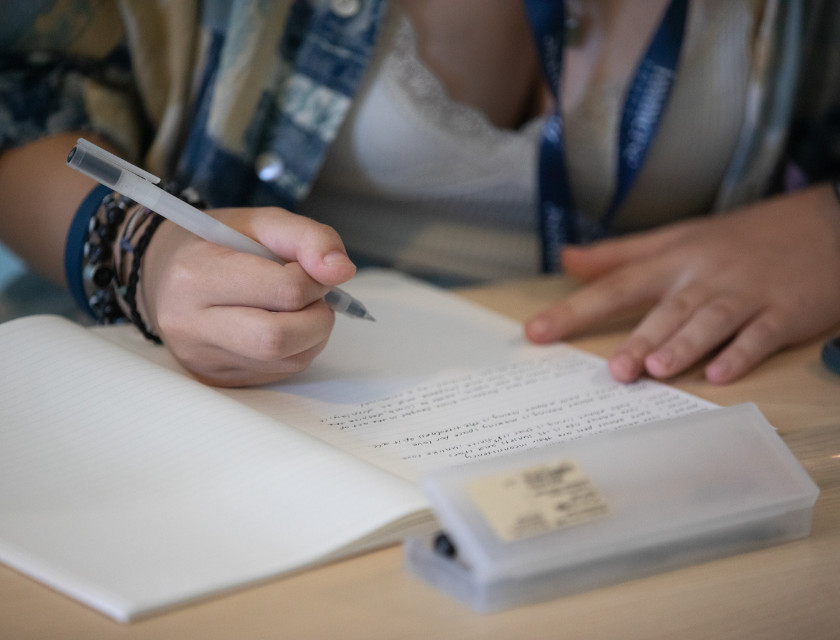
Are you searching for the best tips to create the most compelling essay? We’ve compiled some of the best essay writing tips so that you don’t have to search far and wide to learn how to write a good essay. Take a look at these top 100 essay writing tips!
100 Essay Writing Tips
#1 Analyse the question
#2 Define your argument
#3 Use reputable sources of evidence to support your claims (i.e. not Wikipedia)
#4 Share different perspectives
#5 On draft number 1, don’t worry about spelling, punctuation or grammar!
#6 Rewrite draft 2 on a new blank document
#7 Use transitional phrases and words
#8 Divide your essay into three main parts: introduction, main body, conclusion
#9 End your essay on a relevant quote
#10 Check your spelling, punctuation and grammar in your final draft
#11 Cite your sources correctly (check the guidelines or ask your teacher)
#12 Avoid using conjunctions at the start of sentences e.g. And / But / Also
#13 Put direct quotes in quotation marks, citing them correctly
#14 Avoid plagiarism (your teacher or the marker will know if you have copied)
#15 Rephrase your research – put it into your own words
#16 Avoid the repetition of phrases and words
#17 Use a thesaurus to find synonyms for words you have used often
#18 Provide statistics to support your claims
#19 Include facts to support your arguments
#20 Use emotive language where appropriate to write a compelling argument

#21 Avoid spending too much time on your introduction and conclusion
#22 Get somebody else to proofread it
#23 Get feedback from friends and family (or even a teacher)
#24 Don’t be afraid to delete irrelevant points and evidence
#25 Avoid slang and colloquial language
#26 Use formal language throughout your essay
#27 Double space your essay (check essay requirements to ensure you format it correctly)
#28 Use appropriate titles and headings
#29 Use an appropriate font (Times New Roman, size 12 is the most common, acceptable font)
#30 Avoid images unless you have been asked to use them
#31 Avoid talking about yourself or providing anecdotal information
#32 Avoid cliches, try to be original in your writing
#33 Keep your introduction and conclusion short
#34 Stick to the word count (universities usually allow 10% over or under)
#35 Distribute the word count appropriately across your introduction, main body and conclusion (e.g. 10/80/10)
#36 Read it out loud to spot errors
#37 Make sure your writing is clear and concise
#38 Avoid citing sources in your bibliography that are irrelevant
#39 Use grammar checking software to check for grammar errors
#40 Don’t depend solely on grammar checking software (because it’s a computer, it may get context wrong)
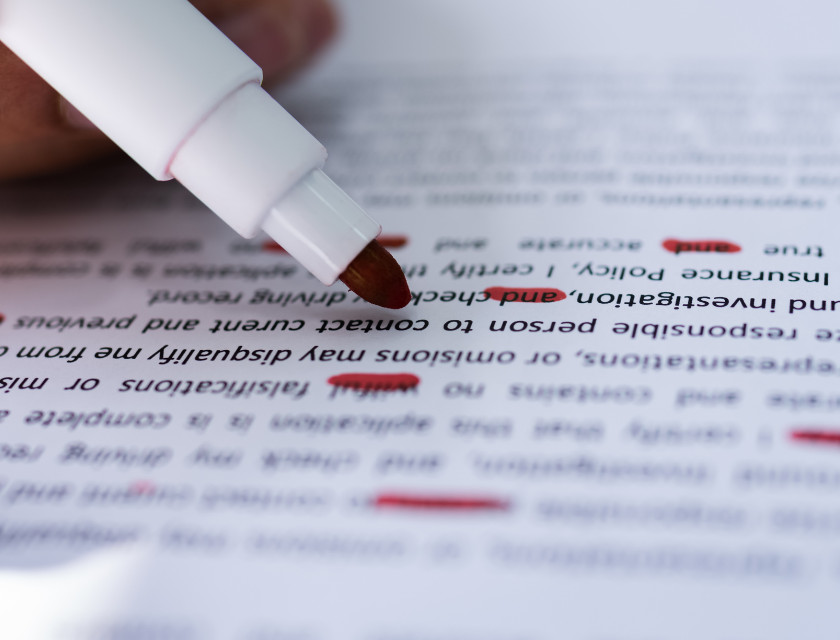
#41 Read your work critically – have you answered the question?
#42 Don’t get distracted by what you WANT to write, focus on answering the question
#43 Check the grading criteria and set your goals – if you want an A, what do you need to do to get there?
#44 Create a checklist based on the grading criteria
#45 Create a timetable to write your essay and plan your time wisely
#46 Plan your writing during times when you’re least likely to get disturbed
#47 Work in a place where you are least likely to get distracted
#48 Write your essay in 25-minute increments and take a break after each one
#49 Have snacks and refreshments to hand
#50 Take a break after writing each draft, for example, 2 days where you don’t look at it (this will allow you to process information and go back to your essay with fresh eyes)
#51 Remember that stress doesn’t help – you’re most likely going to write well when you’re the least stressed.
#52 If you’re struggling to write your essay at home, do it in a study group or at the library. You’ll likely be more productive surrounded by other people who are working, too.
#53 Don’t leave it to the last minute – write several drafts in good time
#54 Plan your final week to work on formatting only (do the bulk of the work way before the final week)
#55 Swap work with a friend and give each other feedback, or do this in a group
#56 Make sure you know the submission criteria way before submitting e.g. the format of your essay, rules for submission, etc.
#57 Define the type of essay you’re writing – is it argumentative, persuasive, expository, admissions, compare/contrast, analytical or narrative?
#58 Brainstorm the essay before writing it
#59 Keep your notes handy
#60 Identify the gaps in your knowledge before writing

#61 Before you begin writing, do as much productive research as you can
#62 Read relevant books and reputable articles to learn more about your topic
#63 Write notes in the form of short answers to your question, it will be easier to put them into your essay later on
#64 If you’re finding it difficult to answer the question, more research is needed
#65 Identify your WHY – Why do you need to write this essay? What will happen if you get an A or win the essay competition? Why is it important to you?
#66 When essay writing is becoming a struggle, remember your WHY to keep motivated
#67 In your introduction, remember to clearly state your topic and your main points
#68 Avoid explaining your points in your introduction (you do that in the main body)
#69 For every point or opinion you introduce, be sure to include some evidence and an explanation
#70 Avoid filling your essay up with opinions with no supporting evidence
#71 Explain your points clearly and concisely
#72 Stay on topic
#73 When proofreading, consider if the essay sparks the reader’s interest. If it doesn’t, see what you can do to improve this.
#74 Double check you have used paragraphs correctly
#75 Ensure each argument has a single focus and a clear connection to the thesis statement
#76 Ensure you have clear transitions between your sentences and paragraphs
#77 Ensure your essay has an informative and compelling style
#78 Try using these phrases such as: In view of; in light of; considering
#79 Use one of the following sentence structure when writing about your evidence “According to…” “…. stated that, “Referring to the views of…”
#80 Maintain an unbiased voice in your writing – your goal is to present some intriguing arguments to the reader

#81 Try using phrases such as “In order to…”, “To that end…”, “To this end…”
#82 Use phrases like these to emphasize a point: In other words; to put it another way; that is; to put it more simply
#83 Other phrases you could use are: Similarly; likewise; another key fact to remember; as well as; an equally significant aspect of
#84 When comparing ideas or opinions, use phrases such as: By contrast; in comparison; then again; that said; yet
#85 Use these phrases to demonstrate a positive aspect of something: Despite this; provided that; nonetheless
#86 Another way to add contrast is using these phrases: Importantly; significantly; notably; another key point
#87 When giving examples, try using phrases like these: For instance; to give an illustration of; to exemplify; to demonstrate; as evidence; to elucidate
#88 Try using these phrases in your conclusion: In conclusion; to conclude; to summarise; in sum; in the final analysis; on close analysis
#89 This phrase can be used to highlight the most compelling argument in your research “the most compelling argument is…”
#90 When explaining the significance of something, use one of these phrases: Therefore; this suggests that; it can be seen that; the consequence is
#91 When summarizing, you can use some of these phrases: Above all; chiefly; especially; most significantly; it should be noted
#92 You might want to use the phrase “All things considered” when summarizing towards the end of your essay
#93 Avoid using Wikipedia
#94 Remember that the marker will always check to see if you have copied your work – so don’t do it
#95 Try your best
#96 Remember that writing an essay is also an opportunity to learn
#97 Build your vocabulary while writing by using a dictionary to replace common words
#98 Make sure you understand the definition of the words you have used
#99 Work hard but remember to take breaks
#100 Submit your essay on time!

- Administrator
- August 28, 2024
- August 22, 2024
We will send you updates and the latest news about our company. Sign up for free by filling out the form.
- Name * First Last
- School SF ID
- School Country
- School City
- School Name
- School counsellor/advisor
- Educational agent
- I consent to receiving updates from Immerse Education
- Yes. See Privacy Policy
Download Our Prospectus

- I'm a Parent
- I'm a Student
- First Name *
- Last Name *
- Which subjects interest you? (Optional) Architecture Artificial Intelligence Banking and Finance Biology Biotechnology Business Management Chemistry Coding Computer Science Computer Science and Artificial Intelligence Creative Writing Creative Writing and Film Criminology Data Science and Analytics Earth Science Economics Encryption and Cybersecurity Engineering English Literature Entrepreneurship Fashion and Design Female Future Leaders Film Studies Fine Arts Global Society and Sustainability Health and Biotechnology History International Relations Law Marketing and Entertainment Mathematics Medicine Medicine and Health Sciences Nanotechnology Natural Sciences Philosophy Philosophy Politics and Economics Physics Psychology Software Development and AI Software Development and Gaming Veterinary Studies Online Research Programme
Secure priority enrolment for our new summer school location with a small refundable deposit.
" * " indicates required fields
Receive priority enrolment for new summer school locations by registering your interest below.
Our programme consultant will contact you to talk about your options.
- Family Name *
- Phone Number
- Yes. See Privacy Policy.
Subject is unavailable at location
You have selected a subject that is not available at the location that you have previously chosen.
The location filter has been reset, and you are now able to search for all the courses where we offer the subject.
- Build your business
Business Tools
- Profit Margin Calculator
- Business Name Generator
- Slogan Generator
- Traffic Calculator
- Ecommerce Statistics
- Ecommerce Wiki
Free business tools
Start a business and design the life you want – all in one place.
- © 2015-2024 Oberlo

How to Memorize Fast (and Why Most Memorization Tips Suck)
It's not too difficult to learn how to memorize fast and easily – if you use the right strategies, that is.
But most people don't use the right strategies.
In fact, most people don't use any strategy – they use a few tactics that don't work very well. So, let me be straight with you: If you've been using flashcards or repetition to try to drill things into your brain, you're making things difficult for yourself.
It's time to work smarter, not harder .
Here's the thing: Your mind is a supercar that you haven't figured out how to drive yet. With practice, you can learn how to memorize anything – whether it's a new language, speech, or answers to an upcoming exam.
Oh, and learning how to memorize fast doesn't have to suck, either – it can even be fun. For real. This guide will show you how to memorize fast and easily – the smart way.
6 Tips on How to Memorize Fast and Easily
If you want to learn how to memorize things fast and easily, you need to be strategic. Here are six tips on how to memorize fast that you'll learn about in this article:
- Understand your learning style
- Learn the 3 'R's of memorization
- Practice the substitution method
- Learn the story and link method
- Use the memory palace method
- Apply spaced repetition strategically
Step 1. Understand Your Learning Style
Before you try to learn how to memorize fast, it can help to have a basic understanding of how you best interpret and absorb new knowledge.
Now, there are four main learning styles usually referred to by the acronym 'VARK':
- Reading/writing
- Kinesthetic

Let’s take a closer look at each of them.
Visual learners learn best through sight. They like information to be presented visually and tend to prefer seeing and observing things, such as diagrams, pictures, and demonstrations. Many visual learners also like to sketch, draw, and write lists.
2. Auditory
Auditory learners learn best by listening and when the subject matter is communicated through sound.
They'd rather listen to podcasts , lectures, and audiobooks than read books and notes. If they have to read a book, they're likely to absorb more information if they read it aloud to themselves. Many auditory learners also like to engage in discussions.
3. Reading/Writing
Reading/writing learners prefer to learn through the written word.
They learn best when reading books and articles . They also learn well when taking and reviewing notes. This learning style overlaps with visual learning, however, these learners tend to prefer to express themselves through writing.
Traditional western education systems cater to reading/writing learners by focusing on reading books and writing essays.
4. Kinesthetic
Kinesthetic learners learn best by experiencing or doing things. They're sometimes referred to as 'tactile learners.'
This type of learner likes to get moving and use their hands. They excel when they can interpret the subject matter through their physical senses. They prefer hands-on exercises over book-learning every day of the week.
Which Style of Learning Do You Prefer?
It may be pretty obvious which learning style you prefer. For example, it's clear to me that I'm a visual and reading/writing learner – after all, I'm a writer.
However, if you're unsure which style – or styles – of learning you prefer, check out this VARK questionnaire to find out.
It’s also worth noting that most people have a natural preference for more than one style. Oh, and in case you were wondering, no particular learning style is better than the others. They're just different!
Step 2. Learn the 3 'R's of Memorization
It's time to understand the foundations of how to memorize fast and easily: The three 'R's of memorization.
These three steps are the strategy you need to learn how to memorize fast. Here's how they work:
- Registration: The first step is to record a new memory in your mind with the intention of storing it in your long-term memory. To learn how to memorize quickly, it helps to practice effective registration techniques.
- Retention: In this stage, you work to retain the information in your brain and move it from your short-term memory into your long-term memory so that you can recall it later.
- Recall: In the final stage of memorization, you can use techniques to retrieve the information stored in your mind.
People refer to these steps in different ways – for example, some people call them 'encode, store, and retrieve' – but the basic principles are the same.
Most memorization tips miss one or more of these steps.
For example, repetition can help with retention. However, reading something over and over does nothing to encode the information into your mind intentionally. Plus, it provides no mechanism that you can use to recall the information.
In short, to learn how to memorize faster, you need to use all three 'R's.
Step 3. Learn How to Memorize Fast and Easily
Now that you have the basics under your belt, it's time to learn how to memorize something quickly. So, what is the easiest way to remember something?
The best way to memorize things is to use a mnemonic device – which is just a fancy way of saying a memory device.
What is a mnemonic device?
Simply put, a mnemonic device is anything that helps you to remember something. For example, the phrase ''I' before 'E,' except after 'C'' is a mnemonic device.
Here's an example of a visual mnemonic device to help remember the numbers of days in the months, with each knuckle representing a 31-day month:

Whenever you hear about 'memory athletes' that can recall the order of six decks of playing cards, they're using mnemonic devices.
It's not magic. It's just practice, and you can do it too.
There are countless mnemonic devices out there. However, we're going to focus on three of the most popular and effective techniques that you can use to learn how to memorize something faster.
Unlike repetition and flashcards, each of these mnemonic devices uses the three 'R's of memorization – registration, retention, and recall.
1. The Substitution Method
This first memory method is super simple. All you need to do is take what you want to remember and substitute it for something more memorable.
For example, say that you're trying to memorize the periodic table of elements. When trying to remember the first element, 'hydrogen,' you could link it to the word 'hydrant' because they sound similar.
For the second element, helium, you could imagine a balloon filled with helium, and so on.
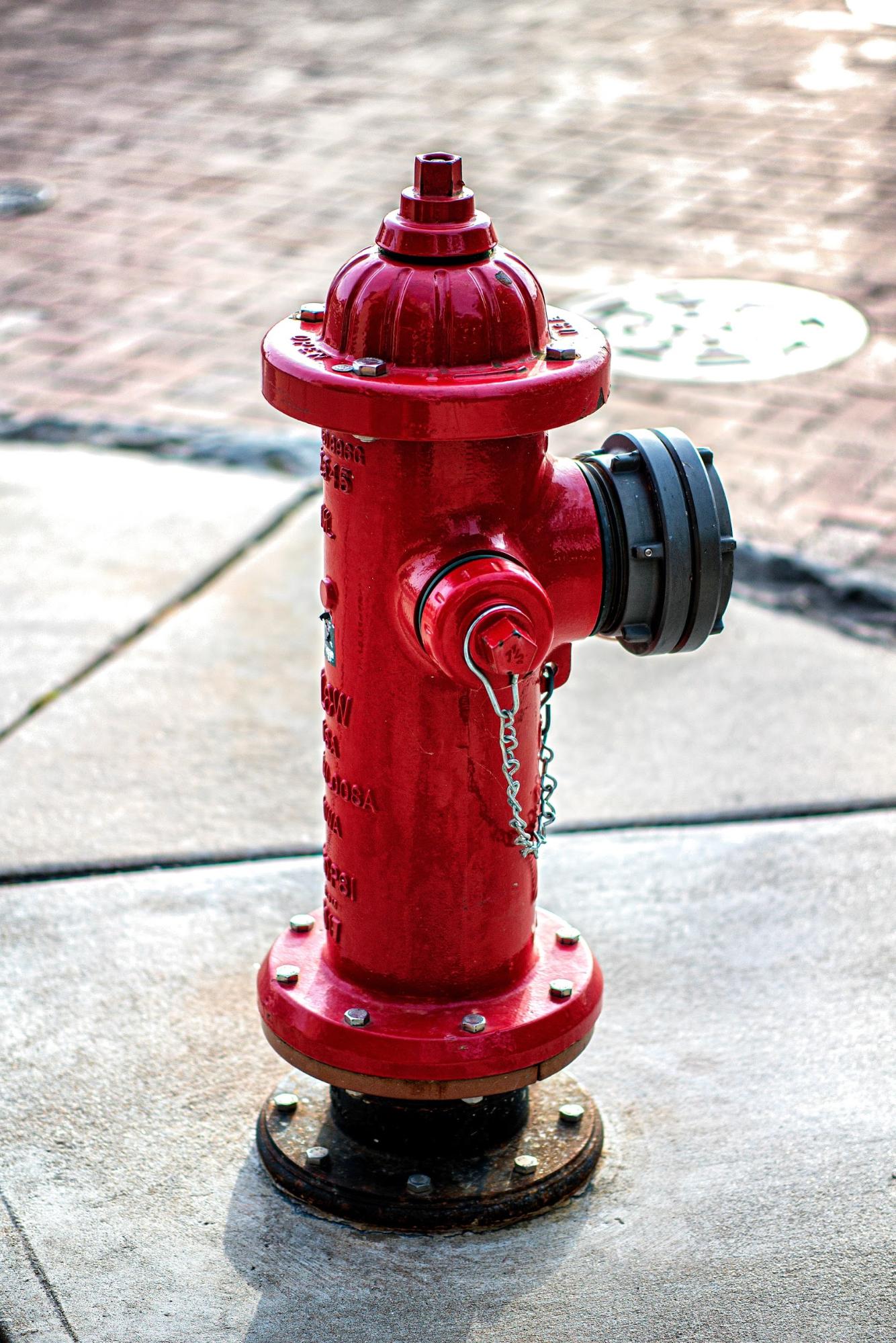
Then, consider which learning style you lean toward and use that information to help you forge a lasting connection. For example:
- If you're a visual learner, you could visualize a bright red fire hydrant on the sidewalk.
- Auditory learners could practice saying the words 'hydrogen, hydrant' out loud to emphasize how they sound similar.
- Reading/writing learners could write the words down, emphasizing how their spellings are similar, with both words beginning with 'h, y, d, r.'
- Every time they walk past a hydrant, kinesthetic learners could touch the hydrant with their hand and practice saying the word 'hydrogen' out loud.
When you need to recall the first element of the periodic table, it'll be a lot easier to remember the red fire hydrant first, which will trigger the memory of 'hydrogen.'
Substitution is an effective way to register new information in your brain and have a way to recall it easily later.
Plus, this technique doesn't just work with words – you can also use it to remember ideas, concepts, names, dates, or even the key talking points in a speech.
Okay, but how do you remember lots of things?
2. The Link and Story Method
Here's where things get interesting: After you've created some substitutions to memorable words and objects, you can link them together with a story.
Here's an example of how you could link 'fire hydrant' (hydrogen) with 'balloon' (helium):
Imagine a bright red hydrant (hydrogen) on a sunny sidewalk at a park entrance. Stood next to the hydrant at the park entrance is a vendor selling balloons (helium) to children entering the park.
Here's the trick: Exaggerate the story so it sticks in your mind more – this will help with retention and recall.
For instance, perhaps the hydrant is broken and is spraying water everywhere. Or maybe the balloon vendor is dressed as a clown. Use whatever works best for you!
Once you create effective associations and link them together with a compelling story , it becomes very easy to remember things.
This method is a great way to register large amounts of information in your mind while also providing a mechanism to recall it.
3. The Memory Palace Method
If you want to know how to memorize a lot of information, try the memory palace method.
This method has stood the test of time – it was first presented in a book called the 'Rhetorica ad Herennium,' written in 80 B.C. by an unknown author.
Here’s how to use it:
- Think of a place or a journey you know well, such as your home or a daily commute.
- Identify some significant points in your home or on your commute .
- Link what you want to remember to each one of those points.
For example, say that you need to remember a speech.
You could break your speech up into points, such as your introduction, three main talking points, your summary, and final thoughts. You can then link each of these points to something in your memory palace.
Your home's front door could represent your speech's introduction. Then, your three main talking points could be the living room, kitchen, and bathroom. The summary may be the hallway leading out of the house, and your final thoughts could be the front yard.
Then, whenever you practice your speech, you can imagine walking around your house for each point.
If you have a long speech – or a large amount of information to remember – you can break the information down into smaller chunks and link them to things in each room.
For example, say you have three aspects in your first talking point (the living room). You could link each one to a piece of furniture, such as the sofa, coffee table, and standing lamp.

If you practice the memory palace method, you should be able to walk around your house – or run through your commute – in your mind and recall all of the information.
Again, this method hits all three 'R's by providing a way to encode, retain, and recall information.
Step 4. Apply Spaced Repetition
Once you've registered new information in your mind, how can you stop yourself from forgetting it? Apply spaced repetition.
Way back in 1885, Hermann Ebbinghaus created the 'Forgetting Curve.' This concept demonstrates how we forget things. Simply put, as soon as we learn something, it starts to fade from our memory.
However, we can prevent this decline by reviewing the information periodically. When we do this, we can increase the strength of the memory.
If you're a visual learner, here's what it looks like:

So, when should you review the subject matter?
At first, it helps to review things often – for example, you may want to review something daily at first, then bi-weekly, and then weekly until you're confident you won't forget it.
Again, look to your preferred learning style to help you. For example:
- Visual learners could draw a storyboard or sketch their memory palace.
- Auditory learners could tell their story aloud or describe walking through their memory palace.
- Reading/writing learners could write their story down and review it regularly.
- Kinesthetic learners could act out the story or walk through their memory palace in real life.
You may also want to review material late in the evening before bed.
Why? Studies show that people who study before bedtime can often remember more of what they learn a day later. Plus, they also felt more confident about their answers.
Summary: How to Memorize Quickly
If you want to learn how to memorize fast, repetition alone won't cut it – you have to be strategic.
Start by identifying how you learn best. Are you a visual, auditory, reading/writing, or kinesthetic learner?
Then, understand the three 'R's of memorization (registration, retention, and recall) and put them to work:
- First, encode the information in your mind using a mnemonic device, such as the substitution method.
- Link this information to a story or memory palace to ensure you can easily recall it later.
- Practice spaced repetition to combat the forgetting curve and retain the information.
What are you trying to learn? What is the best way to memorize something for you?
- How to Train Your Brain for Success: 7 Mind Training Tactics
- How to Stop Procrastinating Now: Everything You Need to Know
- Entrepreneurial Mindset: 20 Ways to Think Like an Entrepreneur
- How to Start a Productive Morning Routine for Success (Proven Method)
Have a language expert improve your writing
Run a free plagiarism check in 10 minutes, generate accurate citations for free.
- Knowledge Base
- How to structure an essay: Templates and tips
How to Structure an Essay | Tips & Templates
Published on September 18, 2020 by Jack Caulfield . Revised on July 23, 2023.
The basic structure of an essay always consists of an introduction , a body , and a conclusion . But for many students, the most difficult part of structuring an essay is deciding how to organize information within the body.
Instantly correct all language mistakes in your text
Upload your document to correct all your mistakes in minutes

Table of contents
The basics of essay structure, chronological structure, compare-and-contrast structure, problems-methods-solutions structure, signposting to clarify your structure, other interesting articles, frequently asked questions about essay structure.
There are two main things to keep in mind when working on your essay structure: making sure to include the right information in each part, and deciding how you’ll organize the information within the body.
Parts of an essay
The three parts that make up all essays are described in the table below.
| Part | Content |
|---|---|
Order of information
You’ll also have to consider how to present information within the body. There are a few general principles that can guide you here.
The first is that your argument should move from the simplest claim to the most complex . The body of a good argumentative essay often begins with simple and widely accepted claims, and then moves towards more complex and contentious ones.
For example, you might begin by describing a generally accepted philosophical concept, and then apply it to a new topic. The grounding in the general concept will allow the reader to understand your unique application of it.
The second principle is that background information should appear towards the beginning of your essay . General background is presented in the introduction. If you have additional background to present, this information will usually come at the start of the body.
The third principle is that everything in your essay should be relevant to the thesis . Ask yourself whether each piece of information advances your argument or provides necessary background. And make sure that the text clearly expresses each piece of information’s relevance.
The sections below present several organizational templates for essays: the chronological approach, the compare-and-contrast approach, and the problems-methods-solutions approach.
Prevent plagiarism. Run a free check.
The chronological approach (sometimes called the cause-and-effect approach) is probably the simplest way to structure an essay. It just means discussing events in the order in which they occurred, discussing how they are related (i.e. the cause and effect involved) as you go.
A chronological approach can be useful when your essay is about a series of events. Don’t rule out other approaches, though—even when the chronological approach is the obvious one, you might be able to bring out more with a different structure.
Explore the tabs below to see a general template and a specific example outline from an essay on the invention of the printing press.
- Thesis statement
- Discussion of event/period
- Consequences
- Importance of topic
- Strong closing statement
- Claim that the printing press marks the end of the Middle Ages
- Background on the low levels of literacy before the printing press
- Thesis statement: The invention of the printing press increased circulation of information in Europe, paving the way for the Reformation
- High levels of illiteracy in medieval Europe
- Literacy and thus knowledge and education were mainly the domain of religious and political elites
- Consequence: this discouraged political and religious change
- Invention of the printing press in 1440 by Johannes Gutenberg
- Implications of the new technology for book production
- Consequence: Rapid spread of the technology and the printing of the Gutenberg Bible
- Trend for translating the Bible into vernacular languages during the years following the printing press’s invention
- Luther’s own translation of the Bible during the Reformation
- Consequence: The large-scale effects the Reformation would have on religion and politics
- Summarize the history described
- Stress the significance of the printing press to the events of this period
Essays with two or more main subjects are often structured around comparing and contrasting . For example, a literary analysis essay might compare two different texts, and an argumentative essay might compare the strengths of different arguments.
There are two main ways of structuring a compare-and-contrast essay: the alternating method, and the block method.
Alternating
In the alternating method, each paragraph compares your subjects in terms of a specific point of comparison. These points of comparison are therefore what defines each paragraph.
The tabs below show a general template for this structure, and a specific example for an essay comparing and contrasting distance learning with traditional classroom learning.
- Synthesis of arguments
- Topical relevance of distance learning in lockdown
- Increasing prevalence of distance learning over the last decade
- Thesis statement: While distance learning has certain advantages, it introduces multiple new accessibility issues that must be addressed for it to be as effective as classroom learning
- Classroom learning: Ease of identifying difficulties and privately discussing them
- Distance learning: Difficulty of noticing and unobtrusively helping
- Classroom learning: Difficulties accessing the classroom (disability, distance travelled from home)
- Distance learning: Difficulties with online work (lack of tech literacy, unreliable connection, distractions)
- Classroom learning: Tends to encourage personal engagement among students and with teacher, more relaxed social environment
- Distance learning: Greater ability to reach out to teacher privately
- Sum up, emphasize that distance learning introduces more difficulties than it solves
- Stress the importance of addressing issues with distance learning as it becomes increasingly common
- Distance learning may prove to be the future, but it still has a long way to go
In the block method, each subject is covered all in one go, potentially across multiple paragraphs. For example, you might write two paragraphs about your first subject and then two about your second subject, making comparisons back to the first.
The tabs again show a general template, followed by another essay on distance learning, this time with the body structured in blocks.
- Point 1 (compare)
- Point 2 (compare)
- Point 3 (compare)
- Point 4 (compare)
- Advantages: Flexibility, accessibility
- Disadvantages: Discomfort, challenges for those with poor internet or tech literacy
- Advantages: Potential for teacher to discuss issues with a student in a separate private call
- Disadvantages: Difficulty of identifying struggling students and aiding them unobtrusively, lack of personal interaction among students
- Advantages: More accessible to those with low tech literacy, equality of all sharing one learning environment
- Disadvantages: Students must live close enough to attend, commutes may vary, classrooms not always accessible for disabled students
- Advantages: Ease of picking up on signs a student is struggling, more personal interaction among students
- Disadvantages: May be harder for students to approach teacher privately in person to raise issues
An essay that concerns a specific problem (practical or theoretical) may be structured according to the problems-methods-solutions approach.
This is just what it sounds like: You define the problem, characterize a method or theory that may solve it, and finally analyze the problem, using this method or theory to arrive at a solution. If the problem is theoretical, the solution might be the analysis you present in the essay itself; otherwise, you might just present a proposed solution.
The tabs below show a template for this structure and an example outline for an essay about the problem of fake news.
- Introduce the problem
- Provide background
- Describe your approach to solving it
- Define the problem precisely
- Describe why it’s important
- Indicate previous approaches to the problem
- Present your new approach, and why it’s better
- Apply the new method or theory to the problem
- Indicate the solution you arrive at by doing so
- Assess (potential or actual) effectiveness of solution
- Describe the implications
- Problem: The growth of “fake news” online
- Prevalence of polarized/conspiracy-focused news sources online
- Thesis statement: Rather than attempting to stamp out online fake news through social media moderation, an effective approach to combating it must work with educational institutions to improve media literacy
- Definition: Deliberate disinformation designed to spread virally online
- Popularization of the term, growth of the phenomenon
- Previous approaches: Labeling and moderation on social media platforms
- Critique: This approach feeds conspiracies; the real solution is to improve media literacy so users can better identify fake news
- Greater emphasis should be placed on media literacy education in schools
- This allows people to assess news sources independently, rather than just being told which ones to trust
- This is a long-term solution but could be highly effective
- It would require significant organization and investment, but would equip people to judge news sources more effectively
- Rather than trying to contain the spread of fake news, we must teach the next generation not to fall for it
Signposting means guiding the reader through your essay with language that describes or hints at the structure of what follows. It can help you clarify your structure for yourself as well as helping your reader follow your ideas.
The essay overview
In longer essays whose body is split into multiple named sections, the introduction often ends with an overview of the rest of the essay. This gives a brief description of the main idea or argument of each section.
The overview allows the reader to immediately understand what will be covered in the essay and in what order. Though it describes what comes later in the text, it is generally written in the present tense . The following example is from a literary analysis essay on Mary Shelley’s Frankenstein .
Transitions
Transition words and phrases are used throughout all good essays to link together different ideas. They help guide the reader through your text, and an essay that uses them effectively will be much easier to follow.
Various different relationships can be expressed by transition words, as shown in this example.
Because Hitler failed to respond to the British ultimatum, France and the UK declared war on Germany. Although it was an outcome the Allies had hoped to avoid, they were prepared to back up their ultimatum in order to combat the existential threat posed by the Third Reich.
Transition sentences may be included to transition between different paragraphs or sections of an essay. A good transition sentence moves the reader on to the next topic while indicating how it relates to the previous one.
… Distance learning, then, seems to improve accessibility in some ways while representing a step backwards in others.
However , considering the issue of personal interaction among students presents a different picture.
If you want to know more about AI tools , college essays , or fallacies make sure to check out some of our other articles with explanations and examples or go directly to our tools!
- Ad hominem fallacy
- Post hoc fallacy
- Appeal to authority fallacy
- False cause fallacy
- Sunk cost fallacy
College essays
- Choosing Essay Topic
- Write a College Essay
- Write a Diversity Essay
- College Essay Format & Structure
- Comparing and Contrasting in an Essay
(AI) Tools
- Grammar Checker
- Paraphrasing Tool
- Text Summarizer
- AI Detector
- Plagiarism Checker
- Citation Generator
The structure of an essay is divided into an introduction that presents your topic and thesis statement , a body containing your in-depth analysis and arguments, and a conclusion wrapping up your ideas.
The structure of the body is flexible, but you should always spend some time thinking about how you can organize your essay to best serve your ideas.
An essay isn’t just a loose collection of facts and ideas. Instead, it should be centered on an overarching argument (summarized in your thesis statement ) that every part of the essay relates to.
The way you structure your essay is crucial to presenting your argument coherently. A well-structured essay helps your reader follow the logic of your ideas and understand your overall point.
Comparisons in essays are generally structured in one of two ways:
- The alternating method, where you compare your subjects side by side according to one specific aspect at a time.
- The block method, where you cover each subject separately in its entirety.
It’s also possible to combine both methods, for example by writing a full paragraph on each of your topics and then a final paragraph contrasting the two according to a specific metric.
You should try to follow your outline as you write your essay . However, if your ideas change or it becomes clear that your structure could be better, it’s okay to depart from your essay outline . Just make sure you know why you’re doing so.
Cite this Scribbr article
If you want to cite this source, you can copy and paste the citation or click the “Cite this Scribbr article” button to automatically add the citation to our free Citation Generator.
Caulfield, J. (2023, July 23). How to Structure an Essay | Tips & Templates. Scribbr. Retrieved August 29, 2024, from https://www.scribbr.com/academic-essay/essay-structure/
Is this article helpful?

Jack Caulfield
Other students also liked, comparing and contrasting in an essay | tips & examples, how to write the body of an essay | drafting & redrafting, transition sentences | tips & examples for clear writing, get unlimited documents corrected.
✔ Free APA citation check included ✔ Unlimited document corrections ✔ Specialized in correcting academic texts
Student Success @ Illinois
Study tips & strategies.
An important aspect of success in class is being prepared and learning to study effectively. Below are some tips, strategies, and resources curated by students and staff.
Tips for Studying by Yourself
- Make a schedule of when, where, and how long you study.
- Make an agenda of what subjects or concepts you want to study.
- Eliminate distractions by silencing your phone, computer, or other devices that may take away your focus.
- Set goals for yourself. For example: “By the end of this study session, I want to be able to do/understand ________.“
- Find a study location that works best for your learning style. This may be in your room alone or in a coffee shop surrounded by others. Just study wherever you study best!
- Take breaks. Use techniques like the Pomodoro Technique (25 minutes of focused study followed by a 5-minute break) to stay focused and maintain productivity.
- Regularly quiz yourself on the material you’re studying to reinforce it into your memory and identify areas that need improvement.
- Reward yourself after a study session. You’ve worked hard, so you deserve to treat yourself!
- Study for 1 or 2 classes per day to maximize comprehension/memorization
- Be consistent in the times you study or at least try to be.
- If you are more of a visual learner, color code your notes .
Tips for Studying with Another Person or Group
- Set clear goals for the study sessions and layout what you want to learn from each study session.
- Hold each other accountable.
- Create a recurring schedule for the study sessions. Find a time that works best for everyone in the group and aim to meet at those regularly scheduled times.
- Assign different topics or sections to each group member and then teach each other. Explaining concepts to others is a great way to reinforce your own understanding.
- Ask questions. Don’t hesitate to ask for clarification or help from your study partners.
- Take breaks. Schedule regular breaks to rest and recharge to prevent academic burnout.
- Review what you’ve learned at the end of each study session and highlight any areas that need further explanation.
- “Teach” someone what you’ve learned. It helps you recite what you’ve learned and allows everyone to add what they know as well.
Study Skill Resources on Campus
- Michael L. Jeffries, Sr. Center for Access and Academic Success
- Academic Skill Consultations
- Residence Halls Tutoring
- Grainger College of Engineering
- Admissions blog
Other Tips and Resources
- Sample of locations where you can study on campus
25 Scientifically Proven Tips for More Effective Studying

Staying on top of schoolwork can be tough.
Whether you’re in high school, or an adult going back to college, balancing coursework with other responsibilities can be challenging. If you’re teetering on the edge of burnout, here are some study tips that are scientifically proven to help you succeed!
Editorial Listing ShortCode:
2024 Ultimate Study Tips Guide
In this guide, we explore scientifically-proven study techniques from scientific journals and some of the world’s best resources like Harvard, Yale, MIT, and Cornell.
In a hurry? Skip ahead to the section that interests you most.
- How to Prepare for Success
- Create Your Perfect Study Space
- Pick a Study Method that Works for You
- Effective Study Skills
- How to Study More Efficiently
- How to Study for Tests
- Memory Improvement Techniques
- Top 10 Study Hacks Backed by Science
- Best Study Apps
- Study Skills Worksheets
- Key Takeaways
This comprehensive guide covers everything from studying for exams to the best study apps. So, let’s get started!
Part 1 – How to Prepare for Success

1. Set a Schedule
“Oh, I’ll get to it soon” isn’t a valid study strategy. Rather, you have to be intentional about planning set study sessions .
On your calendar, mark out chunks of time that you can devote to your studies. You should aim to schedule some study time each day, but other commitments may necessitate that some sessions are longer than others.
Harder classes require more study time. So, too, do classes that are worth several credits. For each credit hour that you’re taking, consider devoting one to three hours to studying each week.
2. Study at Your Own Pace
Do you digest content quickly, or do you need time to let the material sink in? Only you know what pace is best for you.
There’s no right (or wrong) study pace. So, don’t try matching someone else’s speed.
Instead, through trial and error, find what works for you. Just remember that slower studying will require that you devote more time to your schoolwork.
3. Get Some Rest
Exhaustion helps no one perform their best. Your body needs rest ; getting enough sleep is crucial for memory function.
This is one reason that scheduling study time is so important: It reduces the temptation to stay up all night cramming for a big test. Instead, you should aim for seven or more hours of sleep the night before an exam.

Limit pre-studying naps to 15 or 20 minutes at a time. Upon waking, do a few stretches or light exercises to prepare your body and brain for work.
4. Silence Your Cell Phone
Interruptions from your phone are notorious for breaking your concentration. If you pull away to check a notification, you’ll have to refocus your brain before diving back into your studies.
Consider turning off your phone’s sounds or putting your device into do not disturb mode before you start. You can also download apps to temporarily block your access to social media .
If you’re still tempted to check your device, simply power it off until you’re finished studying.
Research shows that stress makes it harder to learn and to retain information.
Stress-busting ideas include:
- Taking deep breaths
- Writing down a list of tasks you need to tackle
- Doing light exercise
Try to clear your head before you begin studying.
Part 2 – Create Your Perfect Study Space

1. Pick a Good Place to Study
There’s a delicate balance when it comes to the best study spot : You need a place that’s comfortable without being so relaxing that you end up falling asleep. For some people, that means working at a desk. Others do better on the couch or at the kitchen table. Your bed, on the other hand, may be too comfy.
Surrounding yourself with peace and quiet helps you focus. If your kids are being loud or there’s construction going on outside your window, you might need to relocate to an upstairs bedroom, a quiet cafe or your local library.
2. Choose Your Music Wisely
Noise-canceling headphones can also help limit distractions.
It’s better to listen to quiet music than loud tunes. Some people do best with instrumental music playing in the background.

Songs with lyrics may pull your attention away from your textbooks. However, some folks can handle listening to songs with words, so you may want to experiment and see what works for you.
Just remember that there’s no pressure to listen to any music. If you do your best work in silence, then feel free to turn your music player off.
3. Turn Off Netflix
If song lyrics are distracting, just imagine what an attention sucker the television can be! Serious studying requires that you turn off the TV.
The same goes for listening to radio deejays. Hearing voices in the background takes your brainpower off of your studies.
4. Use Background Sounds
Turning off the television, talk radio and your favorite pop song doesn’t mean that you have to study in total silence. Soft background sounds are a great alternative.
Some people enjoy listening to nature sounds, such as ocean waves or cracks of thunder. Others prefer the whir of a fan.
5. Snack on Brain Food
A growling stomach can pull your mind from your studies, so feel free to snack as you work. Keep your snacks within arm’s reach, so you don’t have to leave your books to find food.
Fuel your next study session with some of the following items:
- Lean deli meat
- Grapes or apple slices
- Dark chocolate
Go for snacks that will power your brain and keep you alert. Steer clear of items that are high in sugar, fat and processed carbs.
Part 3 – Pick a Study Method That Works for You
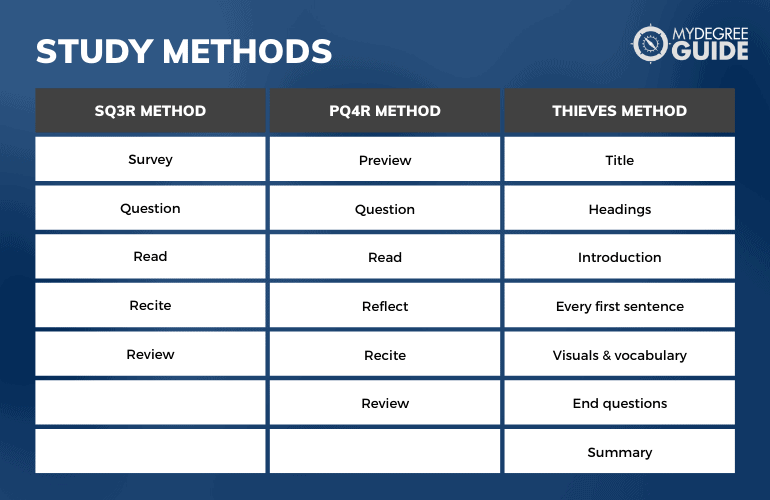
Mindlessly reading through your notes or textbooks isn’t an effective method of studying; it doesn’t help you process the information. Instead, you should use a proven study strategy that will help you think through the material and retain the information.
Strategy #1 – SQ3R Method
With the SQ3R approach to reading , you’ll learn to think critically about a text.
There are five steps:
- Survey : Skim through the assigned material. Focus on headings, words in bold print and any diagrams.
- Question : Ask yourself questions related to the topic.
- Read : Read the text carefully. As you go, look for answers to your questions.
- Recite : Tell yourself the answers to your questions. Write notes about them, even.
- Review : Go over the material again by rereading the text and reading your notes aloud.
Strategy #2 – PQ4R Method
PQ4R is another study strategy that can help you digest the information you read.
This approach has six steps:
- Preview : Skim the material. Read the titles, headings and other highlighted text.
- Question : Think through questions that pertain to the material.
- Read : As you work through the material, try to find answers to your questions.
- Reflect : Consider whether you have any unanswered questions or new questions.
- Recite : Speak aloud about the things you just read.
- Review : Look over the material one more time.
Strategy #3 – THIEVES Method
The THIEVES approach can help you prepare to read for information.
There are seven pre-reading steps:
- Title : Read the title.
- Headings : Look through the headings.
- Introduction : Skim the intro.
- Every first sentence in a section : Take a look at how each section begins.
- Visuals and vocabulary : Look at the pictures and the words in bold print.
- End questions : Review the questions at the end of the chapter.
- Summary : Read the overview of the text.
Ask yourself thought-provoking questions as you work through these steps. After completing them, read the text.
Studying Online
Although these three study strategies can be useful in any setting, studying online has its own set of challenges.
Dr. Tony Bates has written a thoughtful and thorough guide to studying online, A Student Guide to Studying Online . Not only does he highlight the importance of paying attention to course design, but he also offers helpful tips on how to choose the best online program and manage your course load.
Part 4 – Effective Study Skills
1. Highlight Key Concepts
Looking for the most important information as you read helps you stay engaged with the material . This can help keep your mind from wandering as you read.
As you find important details, mark them with a highlighter, or underline them. It can also be effective to jot notes along the edges of the text. Write on removable sticky notes if the book doesn’t belong to you.
When you’re preparing for a test, begin your studies by reviewing your highlighted sections and the notes you wrote down.
2. Summarize Important Details
One good way to get information to stick in your brain is to tell it again in your own words. Writing out a summary can be especially effective. You can organize your summaries in paragraph form or in outline form.
Keep in mind that you shouldn’t include every bit of information in a summary. Stick to the key points.
Consider using different colors on your paper. Research shows that information presented in color is more memorable than things written in plain type. You could use colored pens or go over your words with highlighters.
After writing about what you read, reinforce the information yet again by reading aloud what you wrote on your paper.
3. Create Your Own Flashcards
For an easy way to quiz yourself , prepare notecards that feature a keyword on one side and important facts or definitions about that topic on the reverse.
Writing out the cards will help you learn the information. Quizzing yourself on the cards will continue that reinforcement.
The great thing about flashcards is that they’re easily portable. Slip them in your bag, so you can pull them out whenever you have a spare minute. This is a fantastic way to squeeze in extra practice time outside of your regularly scheduled study sessions.
As an alternative to paper flashcards, you can also use a computer program or a smartphone app to make digital flashcards that you can click through again and again.
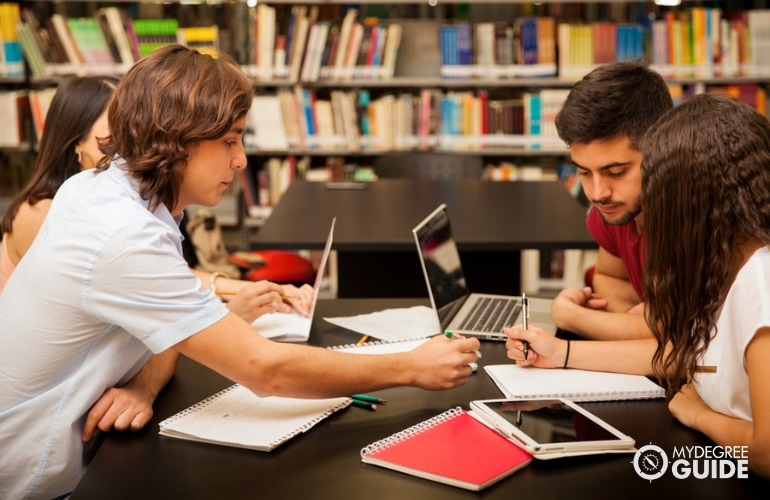
4. Improve Recall with Association
Sometimes your brain could use an extra hand to help you hold onto the information that you’re studying. Creating imaginary pictures, crafting word puzzles or doing other mental exercises can help make your material easier to remember.
Try improving recall with the following ideas:
- Sing the information to a catchy tune.
- Think of a mnemonic phrase in which the words start with the same letters as the words that you need to remember.
- Draw a picture that helps you make a humorous connection between the new information and the things that you already know.
- Envision what it would be like to experience your topic in person. Imagine the sights, sounds, smells and more.
- Think up rhymes or tongue twisters that can help the information stick in your brain.
- Visualize the details with a web-style mind map that illustrates the relationships between concepts.
5. Absorb Information in Smaller Chunks
Think about how you memorize a phone number: You divide the 10-digit number into three smaller groups. It’s easier to get these three chunks to stick in your mind than it is to remember the whole thing as a single string of information.
You can use this strategy when studying by breaking a list down into smaller parts. Work on memorizing each part as its own group.
6. Make Your Own Study Sheet
Condensing your most important notes onto one page is an excellent way to keep priority information at your fingertips. The more you look over this sheet and read it aloud, the better that you’ll know the material.

Furthermore, the act of typing or writing out the information will help you memorize the details. Using different colors or lettering styles can help you picture the information later.
Just like flashcards, a study sheet is portable. You can pull it out of your bag whenever you have a spare minute.
7. Be the Teacher
To teach information to others, you first have to understand it yourself. Therefore, when you’re trying to learn something new, challenge yourself to consider how you’d teach it to someone else. Wrestling with this concept will help you gain a better understanding of the topic.
In fact, you can even recruit a friend, a family member or a study group member to listen to your mini-lesson. Reciting your presentation aloud to someone else will help the details stick in your mind, and your audience may be able to point out gaps in your knowledge.
8. Know When to Call It a Day
Yes, you really can get too much of a good thing. Although your studies are important, they shouldn’t be the only thing in your life. It’s also important to have a social life, get plenty of exercise, and take care of your non-school responsibilities.
Studies show that too much time with your nose in the books can elevate your stress level , which can have a negative effect on your school performance and your personal relationships.
Too much studying may also keep you from getting enough exercise. This could lower your bone density or increase your percentage of body fat.
Part 5 – How to Study More Efficiently

1. Take Regular Breaks
Study sessions will be more productive if you allow yourself to take planned breaks. Consider a schedule of 50 minutes spent working followed by a 10-minute break.
Your downtime provides a good chance to stand up and stretch your legs. You can also use this as an opportunity to check your phone or respond to emails. When your 10 minutes are up, however, it’s time to get back to work.
At the end of a long study session, try to allow yourself a longer break — half an hour, perhaps — before you move on to other responsibilities.
2. Take Notes in Class
The things that your teacher talks about in class are most likely topics that he or she feels are quite important to your studies. So, it’s a good idea to become a thorough note-taker.
The following tips can help you become an efficient, effective note-taker:
- Stick to the main points.
- Use shorthand when possible.
- If you don’t have time to write all the details, jot down a keyword or a name. After class, you can use your textbook to elaborate on these items.
- For consistency, use the same organizational system each time you take notes.
- Consider writing your notes by hand, which can help you remember the information better. However, typing may help you be faster or more organized.
Recording important points is effective because it forces you to pay attention to what’s being said during a lecture.
3. Exercise First
Would you believe that exercise has the potential to grow your brain ? Scientists have shown this to be true!
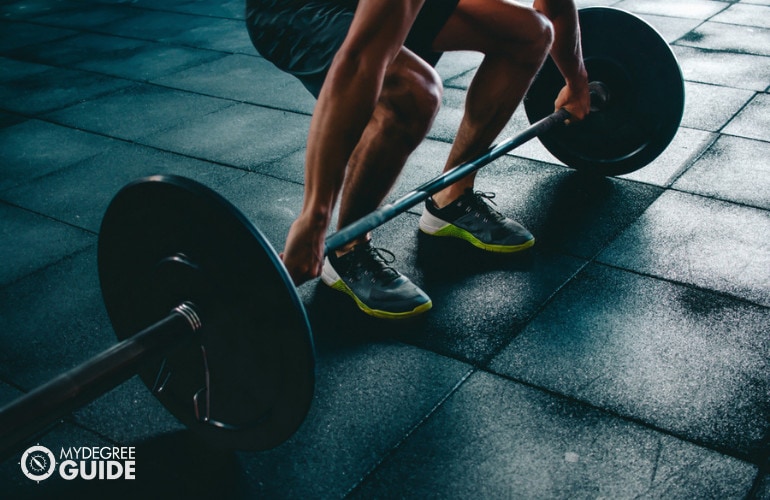
In fact, exercise is most effective at generating new brain cells when it’s immediately followed by learning new information.
There are short-term benefits to exercising before studying as well. Physical activity helps wake you up so you feel alert and ready when you sit down with your books.
4. Review and Revise Your Notes at Home
If your notes are incomplete — for example, you wrote down dates with no additional information — take time after class to fill in the missing details. You may also want to swap notes with a classmate so you can catch things that you missed during the lecture.
- Rewrite your notes if you need to clean them up
- Rewriting will help you retain the information
- Add helpful diagrams or pictures
- Read through them again within one day
If you find that there are concepts in your notes that you don’t understand, ask your professor for help. You may be able to set up a meeting or communicate through email.
After rewriting your notes, put them to good use by reading through them again within the next 24 hours. You can use them as a reference when you create study sheets or flashcards.
5. Start with Your Toughest Assignments
Let’s face it: There are some subjects that you like more than others. If you want to do things the smart way, save your least challenging tasks for the end of your studies. Get the hardest things done first.
If you save the toughest tasks for last, you’ll have them hanging over your head for the whole study session. That can cost you unnecessary mental energy.

Furthermore, if you end with your favorite assignments, it will give you a more positive feeling about your academic pursuits. You’ll be more likely to approach your next study session with a good attitude.
6. Focus on Key Vocabulary
To really understand a subject, you have to know the words that relate to it. Vocabulary words are often written in textbooks in bold print. As you scan the text, write these words down in a list.
Look them up in a dictionary or in the glossary at the back of the book. To help you become familiar with the terms, you could make a study sheet with the definitions or make flashcards.
7. Join a Study Group
Studying doesn’t always have to be an individual activity.
Benefits of a study group include:
- Explaining the material to one another
- Being able to ask questions about things you don’t understand
- Quizzing each other or playing review games
- Learning the material more quickly than you might on your own
- Developing soft skills that will be useful in your career, such as teamwork and problem solving
- Having fun as you study
Gather a few classmates to form a study group.
Part 6 – How to Study for Tests

1. Study for Understanding, Not Just for the Test
Cramming the night before a big test usually involves trying to memorize information long enough to be able to regurgitate it the next morning. Although that might help you get a decent grade or your test, it won’t help you really learn the material .
Within a day or two, you’ll have forgotten most of what you studied. You’ll have missed the goal of your classes: mastery of the subject matter.
Instead, commit yourself to long-term learning by studying throughout the semester.
2. Begin Studying at Least One Week in Advance
Of course, you may need to put in extra time before a big test, but you shouldn’t put this off until the night before.
Instead, in the week leading up to the exam, block off a daily time segment for test preparation. Regular studying will help you really learn the material.
3. Spend at Least One Hour per Day Studying
One week out from a big test, study for an hour per night. If you have two big tests coming up, increase your daily study time, and divide it between the two subjects.

The day before the exam, spend as much time as possible studying — all day, even.
4. Re-write Class Notes
After each class, you should have fleshed out your notes and rewritten them in a neat, organized format. Now, it’s time to take your re-done notes and write them once again.
This time, however, your goal is to condense them down to only the most important material. Ideally, you want your rewritten notes to fit on just one or two sheets of paper.
These sheets should be your main study resource during test preparation.
5. Create a Study Outline
Early in the week, make a long outline that includes many of the details from your notes. Rewrite it a few days later, but cut the material in half.
Shortly before the test, write it one more time; include only the most important information. Quiz yourself on the missing details.
6. Make Your Own Flashcards
Another way to quiz yourself is to make flashcards that you can use for practice written tests.
First, read the term on the front side. Encourage yourself to write out the definition or details of that term. Compare your written answer with what’s on the back of the card.
This can be extra helpful when prepping for an entrance exam like the GRE, though there are a growing number of schools that don’t require GRE scores for admission.
7. Do Sample Problems and Essays from Your Textbook
There are additional things you can do to practice test-taking. For example, crack open your book, and solve problems like the ones you expect to see on the test.
Write out the answers to essay questions as well. There may be suggested essay topics in your textbook.
Part 7 – Memory Improvement Techniques

1. Study Right Before Bed
Although you shouldn’t pull all-nighters, studying right before bedtime can be a great idea.
Sleep helps cement information in your brain. Studies show that you’re more likely to recall information 24 hours later if you went to bed shortly after learning it.
Right before bed, read through your study sheet, quiz yourself on flashcards or recite lists of information.
2. Study Small Chunks at a Time
If you want to remember information over the long haul, don’t try to cram it all in during one sitting.
Instead, use an approach called spaced repetition :
- Break the information into parts
- Learn one new part at a time over the course of days or weeks
- Review your earlier acquisitions each time you study
The brain stores information that it thinks is important. So, when you regularly go over a topic at set intervals over time, it strengthens your memory of it.
3. Tell a Story
Sometimes, you just need to make information silly in order to help it stick in your brain.
To remember a list of items or the particular order of events, make up a humorous story that links those things or words together. It doesn’t necessarily need to make sense; it just needs to be memorable .
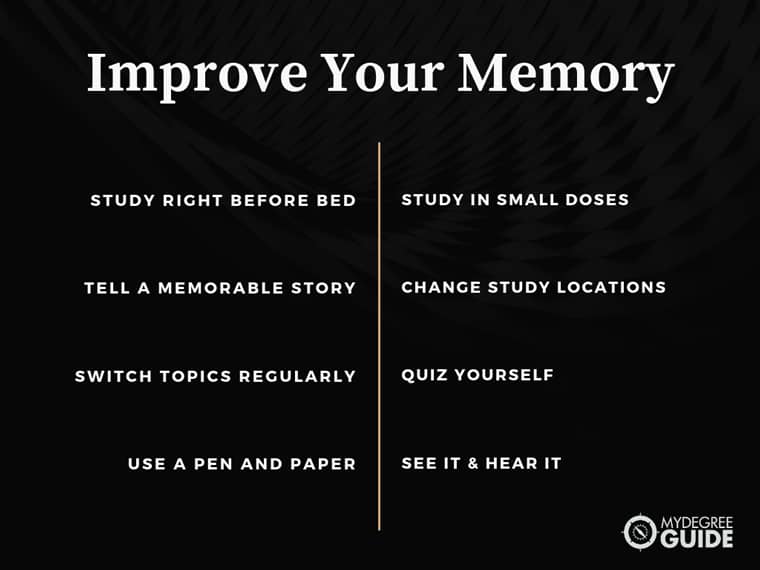
4. Change Study Locations Often
Studying the same information in multiple places helps the details stick in your mind better.
Consider some of the following locations:
- Your desk at home
- A coffee shop
- The library
- Your backyard
It’s best to switch between several different study spots instead of always hitting the books in the same place.
5. Swap Topics Regularly
Keeping your brain trained on the same information for long periods of time isn’t beneficial. It’s smarter to jump from one subject to another a few times during a long study session.
Along those same lines, you should study the same material in multiple ways. Research shows that using varied study methods for the same topic helps you perform better on tests.
6. Quiz Yourself
Challenge yourself to see what you can remember. Quizzing yourself is like practicing for the test, and it’s one of the most effective methods of memory retention .
If it’s hard to remember the information at first, don’t worry; the struggle makes it more likely that you’ll remember it in the end.
7. Go Old-school: Use a Pen and Paper
The act of writing answers helps you remember the information. Here are some ways to use writing while studying:
- Recopy your notes
- Write the answers to flashcards
- Make a study sheet
- Practice writing essay answers
Writing by hand is best because it requires your attention and focus.
8. See It & Hear It
Say information out loud, and you’ll be more likely to remember it. You’re engaging your eyes as you read the words, your mouth as you say them, and your ears as you hear yourself.
Scientists call the benefit of speaking information aloud production effect .
Part 8 – Top 10 Study Hacks Backed by Science

1. Grab a Coffee
Drinking coffee (or your preferred high-octane beverage) while you study may help keep you alert so you don’t doze off mid-session. There’s even evidence that caffeine can improve your memory skills.
However, avoid sugary beverages. These could cause your energy level to crash in a few hours.
2. Reward Yourself
Studies show that giving yourself a reward for doing your work helps you enjoy the effort more.
Do it right away; don’t wait until the test is over to celebrate. For example, after finishing a three-hour study session, treat yourself to an ice cream cone or a relaxing bath.
3. Study with Others
Working with a study group holds you accountable so it’s harder to procrastinate on your work.
When you study together, you can fill in gaps in one another’s understanding, and you can quiz each other on the material.
Besides, studying with a group can be fun!
4. Meditate
It may be hard to imagine adding anything else to your packed schedule, but dedicating time to mindfulness practices can really pay off.

Studies show that people who meditate may perform better on tests , and they are generally more attentive.
Mindfulness apps can help you get started with this practice.
5. Hit the Gym
To boost the blood flow to your brain, do half an hour of cardio exercise before sitting down to study.
Aerobic exercise gives your brain a major dose of oxygen and other important nutrients, which may help you think clearly, remember facts and do your best work.
6. Play Some Music
Listening to tunes can help you focus. Studies show that the best study music is anything that features a rhythmic beat .
It’s smart to choose a style that you like. If you like classical, that’s fine, but you could also go for electronica or modern piano solos.
7. Grab Some Walnuts
A diet rich in omega-3 fatty acids helps your brain do its best work.
Good sources include:
- Fish: cod liver oil, salmon and mackerel
- Vegetables: spinach and Brussels sprouts
To calm your pre-test jitters, eat a mix of omega-3 and omega-6 foods.
8. Take Regular Breaks
Your brain needs some downtime. Don’t try to push through for hours on end. Every hour, take a break for several minutes.

Breaks are good for your mental health . They also improve your attention span, your creativity and your productivity.
During a break, it’s best to move around and exercise a bit.
9. Get Some Sleep
Although studying is important, it can’t come at the expense of your rest. Sleep gives your brain a chance to process the information that you’ve learned that day.
If you don’t get enough sleep, you’ll have a hard time focusing and remembering information.
Even during busy test weeks, try to get seven to nine hours of sleep each night.
10. Eliminate Distractions
It’s hard to get much studying done when you’re busy scrolling Instagram. Put away your phone and computer while studying, or at least block your social media apps.
Turn off the television while you work, too.
If you’re studying in a noisy area, put on headphones that can help block the distracting sounds.
Part 9 – The Best Study Apps

1. iStudiez Pro Legend
Scheduling study time is a must, and iStudiez Pro Legend lets you put study sessions, classes and assignments on your calendar. Color coding the entries can help you stay organized.
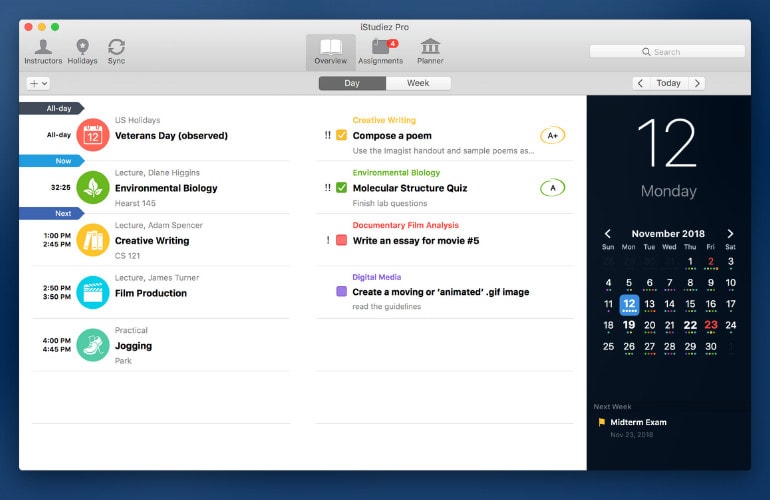
For each class, you can enter meeting times and homework assignments, and you can keep track of your grades.
2. Dragon Anywhere
Instead of writing notes in the margins of your textbooks, you can use Dragon Anywhere’s voice dictation feature to record your thoughts and insights.
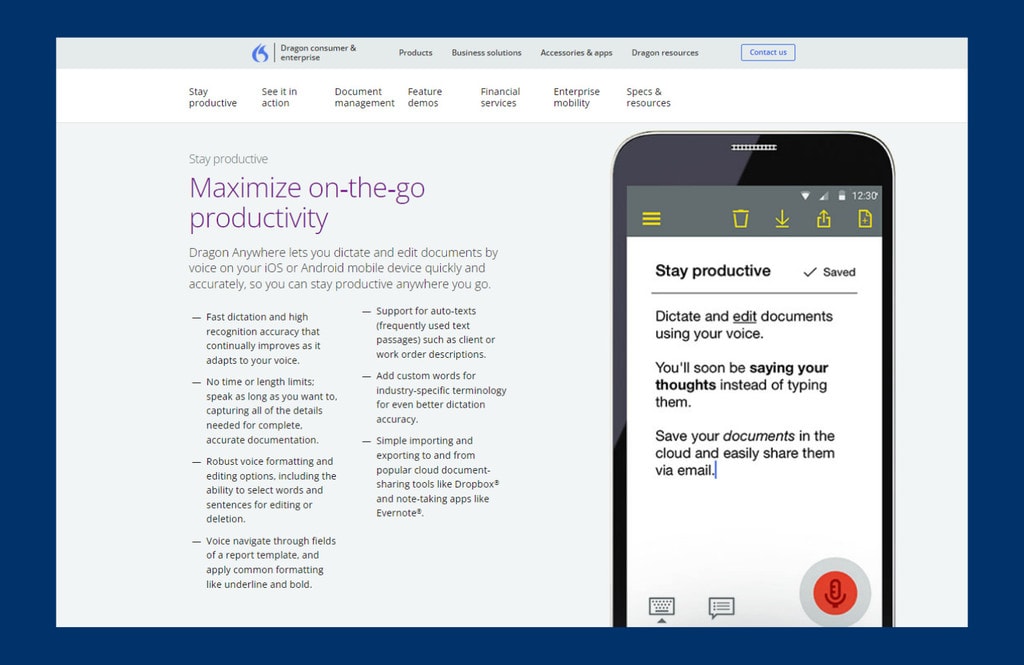
Just be sure to rewrite your dictated notes in your own handwriting later for maximum learning!
3. Evernote
When you’re in school, you have a lot of responsibilities to juggle, but Evernote can help you organize them.
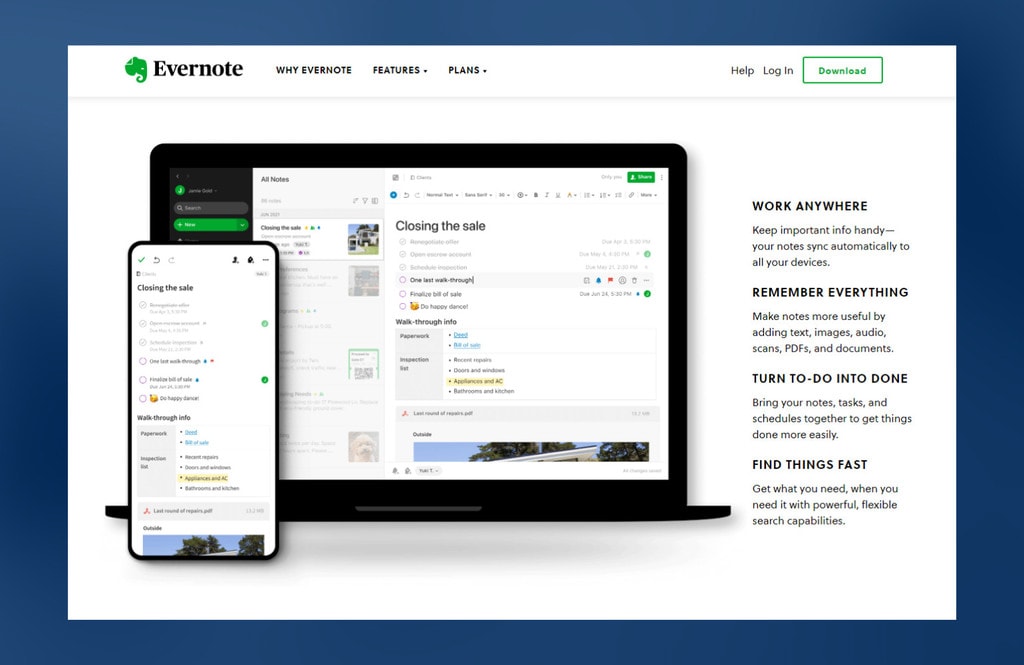
You can add notes and documents to store them in one digital spot, and tagging them will help you quickly pull up all files for a class or a topic.
4. Quizlet Go
Make digital flashcards that you can practice on your mobile device with Quizlet Go .

This means that you can pull out your phone for a quick study session whenever you have a couple of minutes of downtime. You don’t even need internet access to practice these flashcards.
5. My Study Life
Enter your upcoming tests and assignments into My Study Life , and the app will send you reminder messages.
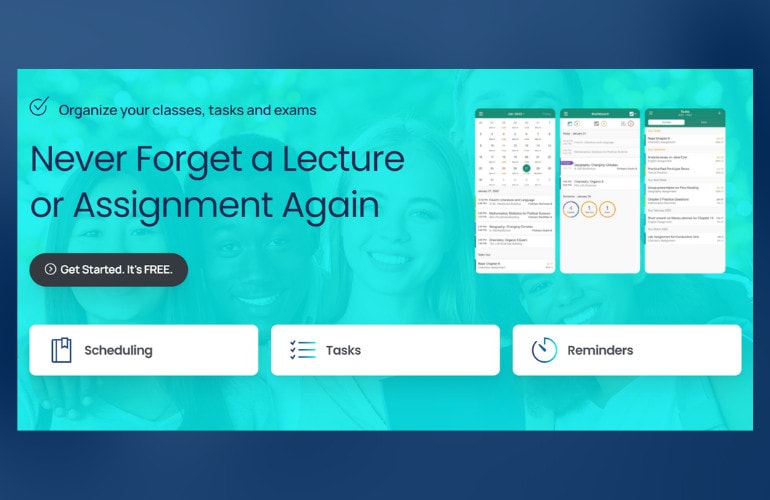
The app has a calendar so you can keep track of your class schedule. It can even notify you when it’s time to go to class.
6. Exam Countdown Lite
You should start studying for tests at least a week in advance. Input the dates for your exams and assignments into Exam Countdown Lite so you’ll have a visual reminder of when you should begin your test prep.
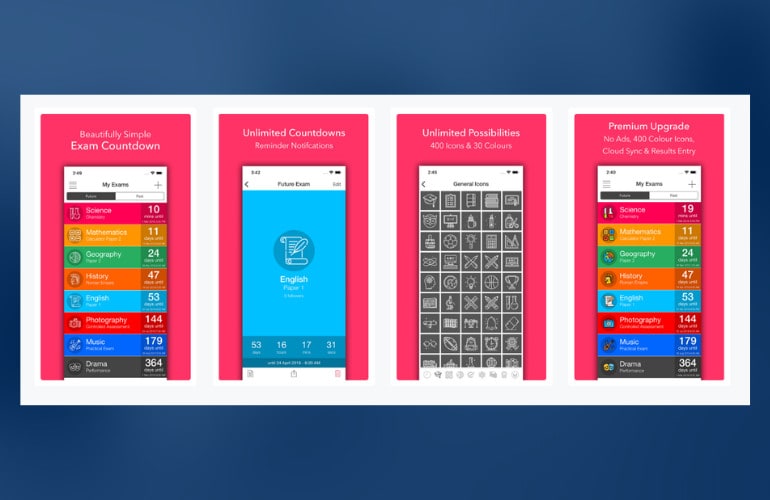
The app can send you notifications as well.
7. Flashcards+
With Chegg’s Flashcards+ , you can make your own digital flashcards or use ones designed by others.
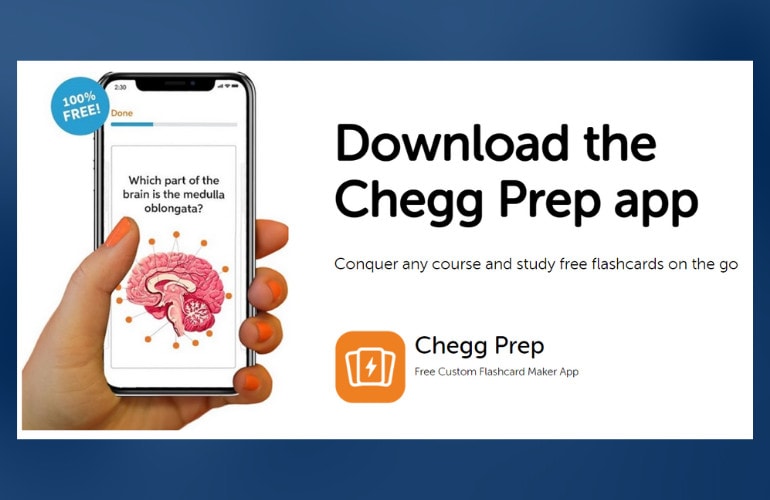
Because you can add images to your cards, you can quiz yourself on the names of famous artworks, important historical artifacts or parts of a scientific diagram.
Organize information into categories by creating a visual mind map on XMind . This can help you classify facts and figures so you see how they relate to one another.

This visual representation can also help you recall the information later.
9. ScannerPro
Do you have piles of handwritten notes everywhere? Once you have written them out, consider scanning them into digital form. ScannerPro lets you use your phone as a scanner.

You can store your scanned files in this app or transfer them to Evernote or another organization system.
Part 10 – Study Skills Worksheets
Could you use more help to develop your study skills? Rutgers University has dozens of study skills worksheets online .

These documents are packed with tips that can help you become a better student. The checklists and charts can help you evaluate your current strengths and organize your work.
Part 11 – Key Takeaways

You’re a busy person, so you need to make the most of every study session.
By now, you should understand the basics of effective studies:
- Schedule study time
- Study regularly
- Minimize distractions
- Read for information
- Write the important stuff down
- Use creative memory tricks
- Quiz yourself
- Be good to your body and your brain
Put these study tips to good use, and you’ll soon learn that you’ve learned how to study smarter.

This site uses various technologies, as described in our Privacy Policy, for personalization, measuring website use/performance, and targeted advertising, which may include storing and sharing information about your site visit with third parties. By continuing to use this website you consent to our Privacy Policy and Terms of Use .
We are experiencing sporadically slow performance in our online tools, which you may notice when working in your dashboard. Our team is fully engaged and actively working to improve your online experience. If you are experiencing a connectivity issue, we recommend you try again in 10-15 minutes. We will update this space when the issue is resolved.
Enter your email to unlock an extra $25 off an SAT or ACT program!
By submitting my email address. i certify that i am 13 years of age or older, agree to recieve marketing email messages from the princeton review, and agree to terms of use., how to study for a test: 10 steps to ace your next test.
We promise your teacher isn’t out to get you. As unpleasant as taking a test can often be, it actually does more than just show your teacher what you know: it can actually help you learn.
Studies have shown that students who are tested regularly actually learn more content and retain it longer than students who have not been tested. Great news for final exams. Frequent testing has even been shown to help decrease test anxiety.
Not sure how to study for a test? Follow these study tips to make your best grade!

1. Get informed
- textbook chapters and topics the test will cover
- test format
2. Think like your teacher
Your homeworks assignments, quizzes, handouts, daily notes , and classwork are all indicators of what your teacher thinks is important about the information and what might appear on the test.
3. Make your own study aids
When it comes to learning, practice tests work BETTER than simply highlighting or re-reading your notes. So, turn your notes into flashcards or use a flashcard app for memorizing Spanish vocab. Ask your friends to quiz you or write your own practice test.
4. Practice for the inevitable
Outline essays ahead of time. For math tests, do plenty of practice problems similar to ones that you KNOW will appear. Make a list of questions that you think might show up on the test (and then make sure you can answer them!).
Free SAT Practice Tests & Events
Evaluate and improve your SAT score.
5. Study every day
If you have a test in a week, studying a little each day will help you identify tough concepts or weak areas in your knowledge in advance. Can't figure out factoring? Log on to Homework Help and get your questions answered.
6. Cut out the distractions

Distractions make it difficult to pay attention to what you’re doing, which in turn makes it harder to commit facts to memory. Give yourself a leg up by turning off the notifications on your phone, temporarily blocking your favorite websites, or sticking to instrumental music while you study (so you’re not tempted to sing along!). Taking a break every 45 minutes or so will also help you stay focused.
7. Divide big concepts from smaller details
If you're studying a big topic—like the Civil War for history or cellular processes for biology —try breaking the material you need to study into chunks. Study one battle at a time or one chapter section at a time—and then quiz yourself. Ask yourself questions about what you’ve just studied, and even write your answers down.
8. Don’t neglect the “easy” stuff
Even if you’ve been acing a certain subject or concept all year and think the test will be a breeze, you should still give it a review before the big day. You don’t want to lose points for careless errors or forget to memorize a key geometry formula.
9. Don’t skip school
Missing classes automatically puts you at a disadvantage. Make sure you go to class (especially during the week leading up to the test) and attend any review sessions your teacher holds. Did you have to miss an important class? You can always ask your teacher or one of our tutors for help catching up.
10. Review the day of the test
Before you take the test, give yourself time for a quick review. Shuffle through those flashcards a couple of times or re-read your chapter outline. This will ensure the material is fresh in your mind.
Still stuck on how to study for a test?
Try an online tutoring session with one of our experts, and get help in 40+ subjects.
Try a Free Session

Explore Colleges For You
Connect with our featured colleges to find schools that both match your interests and are looking for students like you.

Career Quiz
Take our short quiz to learn which is the right career for you.

Get Started on Athletic Scholarships & Recruiting!
Join athletes who were discovered, recruited & often received scholarships after connecting with NCSA's 42,000 strong network of coaches.

Best 389 Colleges
165,000 students rate everything from their professors to their campus social scene.
SAT Prep Courses
1400+ course, act prep courses, free sat practice test & events, 1-800-2review, overcome your test anxiety with our new test-success course.

Free MCAT Practice Test
I already know my score.

MCAT Self-Paced 14-Day Free Trial

Enrollment Advisor
1-800-2REVIEW (800-273-8439) ext. 1
1-877-LEARN-30
Mon-Fri 9AM-10PM ET
Sat-Sun 9AM-8PM ET
Student Support
1-800-2REVIEW (800-273-8439) ext. 2
Mon-Fri 9AM-9PM ET
Sat-Sun 8:30AM-5PM ET
Partnerships
- Teach or Tutor for Us
College Readiness
International
Advertising
Affiliate/Other
- Enrollment Terms & Conditions
- Accessibility
- Cigna Medical Transparency in Coverage
Register Book
Local Offices: Mon-Fri 9AM-6PM
- SAT Subject Tests
Academic Subjects
- Social Studies
Find the Right College
- College Rankings
- College Advice
- Applying to College
- Financial Aid
School & District Partnerships
- Professional Development
- Advice Articles
- Private Tutoring
- Mobile Apps
- International Offices
- Work for Us
- Affiliate Program
- Partner with Us
- Advertise with Us
- International Partnerships
- Our Guarantees
- Accessibility – Canada
Privacy Policy | CA Privacy Notice | Do Not Sell or Share My Personal Information | Your Opt-Out Rights | Terms of Use | Site Map
©2024 TPR Education IP Holdings, LLC. All Rights Reserved. The Princeton Review is not affiliated with Princeton University
TPR Education, LLC (doing business as “The Princeton Review”) is controlled by Primavera Holdings Limited, a firm owned by Chinese nationals with a principal place of business in Hong Kong, China.
Pardon Our Interruption
As you were browsing something about your browser made us think you were a bot. There are a few reasons this might happen:
- You've disabled JavaScript in your web browser.
- You're a power user moving through this website with super-human speed.
- You've disabled cookies in your web browser.
- A third-party browser plugin, such as Ghostery or NoScript, is preventing JavaScript from running. Additional information is available in this support article .
To regain access, please make sure that cookies and JavaScript are enabled before reloading the page.

IMAGES
VIDEO
COMMENTS
Learning Each Part of the Essay. Download Article. 1. Make a schedule. Plan out how long you have to memorize the essay. If you have more time, you can study a little each day for 20 or 30 minutes. If you only have a day or 2, you can memorize it in 30-minute chunks with a break of an hour or 2 in between. [1] 2.
So when it comes to memorising the whole thing, it's a lot easier to break the answer down into logical chunks and work on memorising it bit by bit. So if you want to memorise your Discovery Essay, you might have something like this: Introduction. Theme 1 with the assigned text. Theme 1 with the related text. Theme 2 with the assigned text.
3. Combine the first chunk with the second chunk. Once you have a handle on your chunks, it's time to put them together so you can eventually memorize the whole text. Start with the first text and try to recite it from memory. But this time, instead of stopping with the first chunk, move on to the second chunk.
You have to take intentional action. Second, that action has to be focused on creating a connection or link, a bit like building a bridge. To memorize super-effectively you need to put the 3 R's on steroids, and consciously or intentionally build connections using some specific memory techniques. No, it's not magic. 4.
Tips for Reading an Assignment Prompt When you receive a paper assignment, your first step should be to read the assignment prompt carefully to make sure you understand what you are being asked to do. Sometimes your assignment will be open-ended ("write a paper about anything in the course that interests you").
Designate a study area. The best study spot is one that is quiet, well-lit, and in a low-traffic area. Make sure there is a clear workspace to study and write on. Everyone's needs are different, so it is important you find a spot that works for you. Study in short bursts. For every 30 minutes you study, take a short 10-15 minute break to ...
2. The Memorisation Stage. Objective of committing all of these essay plans to memory by systematically using active recall, spaced repetition, spider diagrams and flashcards. The idea is that, by using these two stages, by the time the exams arrive you'll have memorised so many essay plans that they will either come up in the exam or the ...
The challenge of essay exams Study Strategy 1: Create a study guide Study Strategy 2: Try to guess the questions Study Strategy 3: Study from old exams Study Strategy 4: Outline or write possible answers Study Strategy 5: Study in a group ... Here are some tips on creating a good study guide. Step 1: Read through lecture notes and reading notes ...
Come up with a thesis. Create an essay outline. Write the introduction. Write the main body, organized into paragraphs. Write the conclusion. Evaluate the overall organization. Revise the content of each paragraph. Proofread your essay or use a Grammar Checker for language errors. Use a plagiarism checker.
Every few nights as you review your class notes, look for themes. Come up with your own essay questions based on your themes. Practice your essay questions. As you do, make sure you use vocabulary terms found in your notes and text. Underline them as you go, and go back to review their relevance. If you take effective notes and think in terms ...
To boost the flow of blood to your brain, do thirty minutes of aerobic exercise prior to sitting down to study. Cardio exercise provides your brain with oxygen and fundamental nutrients which may help you think clearly, remember facts and produce your best work. 17. Practice Mindfulness Before (and after) Studying.
How to Study for a Test: General Tips. The four tips below are useful for any test or class you're preparing for. Learn the best way to study for a test from these tips and be prepared for any future exams you take. #1: Stick to a Study Schedule. If you're having trouble studying regularly, creating a study schedule can be a huge help.
Active engagement is the process of constructing meaning from text that involves making connections to lectures, forming examples, and regulating your own learning (Davis, 2007). Active studying does not mean highlighting or underlining text, re-reading, or rote memorization. Though these activities may help to keep you engaged in the task ...
An essay is a written composition that presents and supports a particular idea, argument, or point of view. It's a way to express your thoughts, share information, and persuade others to see things from your perspective. Essays come in various forms, such as argumentative, persuasive, expository, and descriptive, each serving a unique purpose.
Test yourself a couple days later, and then again a week after that. Try a study timer app like SuperMemo or Ultimate Study Timer to help you schedule your study intervals. 6. Create memory cues, called mnemonic devices. One of the easiest ways to access memories is to create associations that trigger those memories.
100 Essay Writing Tips. #1 Analyse the question. #2 Define your argument. #3 Use reputable sources of evidence to support your claims (i.e. not Wikipedia) #4 Share different perspectives. #5 On draft number 1, don't worry about spelling, punctuation or grammar! #6 Rewrite draft 2 on a new blank document. #7 Use transitional phrases and words.
Here are six tips on how to memorize fast that you'll learn about in this article: Understand your learning style. Learn the 3 'R's of memorization. Practice the substitution method. Learn the story and link method. Use the memory palace method. Apply spaced repetition strategically.
The basic structure of an essay always consists of an introduction, a body, and a conclusion. But for many students, the most difficult part of structuring an essay is deciding how to organize information within the body. This article provides useful templates and tips to help you outline your essay, make decisions about your structure, and ...
Hi Guys, How do you memorise essays? just by repetition? Well this video shows you a more effective and fun way to memorise your essays. Stay Connecte...
An important aspect of success in class is being prepared and learning to study effectively. Below are some tips, strategies, and resources curated by students and staff. Tips for Studying by Yourself. Make a schedule of when, where, and how long you study. ... Set clear goals for the study sessions and layout what you want to learn from each ...
5. Snack on Brain Food. A growling stomach can pull your mind from your studies, so feel free to snack as you work. Keep your snacks within arm's reach, so you don't have to leave your books to find food. Fuel your next study session with some of the following items: Lean deli meat.
Writing a good essay fast takes some practice, but it's a great skill to learn. Start by writing a thesis statement. Then come up with three main points that support the thesis. Once those main ...
Hi guys, welcome to the Academic Hacker!! Today, I'll be going through with you guys the best way to memorise essays in one day more quickly and effectively ...
3. Make your own study aids. When it comes to learning, practice tests work BETTER than simply highlighting or re-reading your notes. So, turn your notes into flashcards or use a flashcard app for memorizing Spanish vocab. Ask your friends to quiz you or write your own practice test. 4.
Mastering the Art of Using Transitions and Signposting Transitions and signposting are essential for creating a smooth and coherent flow in your essay. They help the reader navigate through your ideas and understand the logical connections between different paragraphs and sections. Here are some tips to master the art of using transitions and signposting: 1.